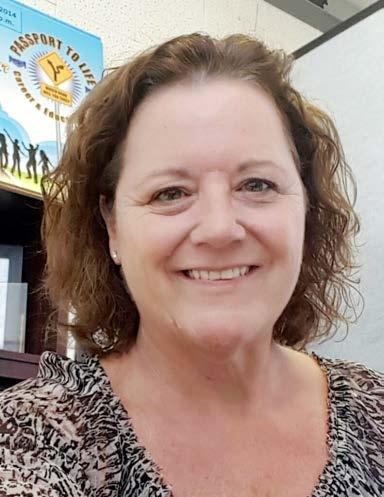






JULIE MYRES AND THE SAN DIEGO COUNTY HIGH SCHOOL MOCK TRIAL

FEATURING
Advice to Take When Running for Judge Leadership Academy 2024
Formation of the Public Defender's Office in San Diego
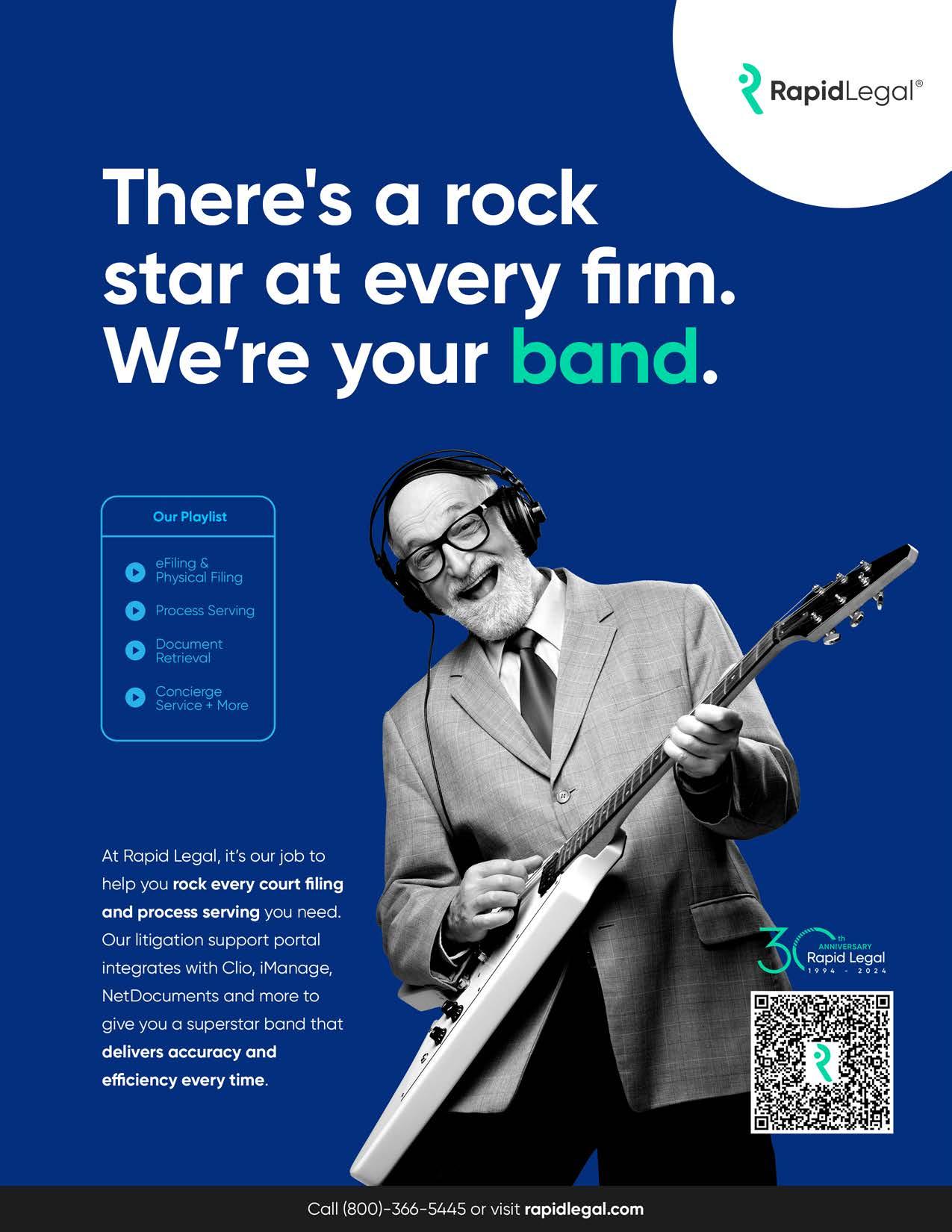














Tech Tips and Tidbits by Bill Kammer BUSINESS
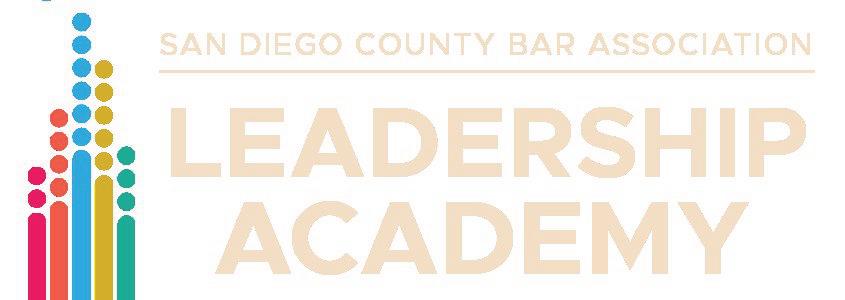

George W. Brewster Jr

The San Diego County Bar Association’s Lawyer Referral and Information Service (LRIS) connected over 60,000 qualified clients with participating attorneys in 2023, resulting in nearly eight million dollars in legal fees earned. You could be one of those attorneys in 2024.
The public trusts LRIS as the reliable way get connected with qualified attorneys. Lawyers trust LRIS too, because we carefully pre-screen potential clients to ensure we only send you referrals that match well with your practice area.
Practically speaking, LRIS offers you the most cost-effective way to gain high-quality clients, hands down. The cost is much lower than other marketing methods, including advertising, SEO, listing/rating services, you name it (lower still with the highly-discounted LRIS enrollment fee offered to SDCBA members — your membership will immediately pay for itself).
Best of all, by participating in LRIS, you will be helping clients access quality legal services they wouldn’t find otherwise — a true win-win.
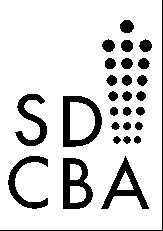
Issue no. 4. San Diego Lawyer® (ISSN: 1096-1887) is published bimonthly by the San Diego County Bar Association, 330 A Street, San Diego, CA 92101. Phone is (619) 231-0781.
The price of an annual subscription to members of the San Diego County Bar Association is included in their dues. Annual subscriptions to all others: $50. Single-copy price: $10.
Periodicals postage paid at San Diego, CA and additional mailing offices. POSTMASTER: Send address changes to San Diego Lawyer, 330 A Street, San Diego, CA 92101. Copyright ©2024 by the San Diego County Bar Association.
All rights reserved. Opinions expressed in San Diego Lawyer are those of the authors only and are not opinions of the SDCBA or the San Diego Lawyer Editorial Committee. In addition, information presented in this magazine is for educational purposes only and should not be construed as legal advice. For your specific questions, please seek advice from counsel.
Interested contributors may submit article ideas to the editors at www.sdcba.org/SDLidea for consideration. San Diego Lawyer reserves the right to edit all submissions, contributed articles, and photographs at its sole discretion.
330 A Street, San Diego, CA 92101
Phone (619) 231-0781 • bar@sdcba.org • www.sdcba.org
Co-Editors
Genevieve A. Suzuki Vaani Chawla
Editorial Committee
Victor Bianchini
George Brewster
Michael Crowley
Jodi Cleesattle
Jenn French
Rafael Hurtado
Isaac Jackson
Edward McIntyre
Kalli Sarkin
Wilson Schooley
Andrea Warren
SAN DIEGO COUNTY BAR ASSOCIATION
Board of Directors
President
Stacey A. Kartchner
President-Elect
Michelle A. Gastil
Immediate Past President
Melissa Johnson Treasurer
Directors
Leslie Abrigo
Michael L. Crowley
Nicole D’Ambrogi
Jason Evans
Sarah Garrick
Nicole Heeder
Spencer Scott Secretary
Timothy G. Williams
Brandon Kimura
Flavio Nominati
Stephanie Pengilley
D. Elisabeth Silva
Cynthia L. Stratton
Fanny Yu
Diversity, Equity, & Inclusion Division Representative Taneashia Morrell
New Lawyer Division Representative
Elijah Gaglio
SDCBA Staff — San Diego Lawyer
Interim Executive Director
Dr. Crystal Trull
Director of Marketing & Outreach
Ron Marcus
Senior Designer
Attiba Royster
Content and Publications Editor
Katelynn Robinson
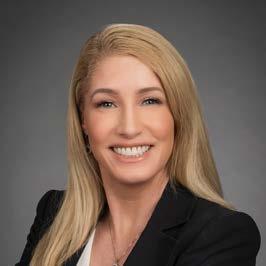

There are countless ways attorneys can involve themselves in their communities and find professional fulfillment beyond providing services to their clients. However, some of the stalwarts that have survived the test of time do so for a reason. They continue to thrive because of the singular way in which they serve the members of our profession. For many, including me, one of those organizations is the San Diego County Bar Association.
Without a doubt, being involved in the SDCBA has been one of the most transformative aspects of my career. I initially started on the Legal Ethics Committee. Since I had worked at the Utah State Bar, Office of Attorney Discipline, during college, I had a lot of experience in ethics, and it was a natural fit. Working with that talented committee motivated me to want to get more involved.
Most presidents and bar leaders speak with pride about how unique San Diego’s legal community is — we act congenially, respect our colleagues and judicial officers, serve the profession, collaborate on issues, passionately and diligently work on behalf of our clients, and creatively address the never-ending struggle of access to justice issues. Hands down, the greatest benefit of being an SDCBA member is our diverse and supportive community. It is a privilege to practice law here, in San Diego, with each of you.
The legal profession can seem lonely at times, but in my experience, there is no better feeling than walking into an SDCBA event and getting excited about connecting with so
many friends and colleagues in the same place. In addition to our events, SDCBA’s listservs, webinars, and live CLEs create and foster connections. The spirited discussions and debates we share with our colleagues are both educational and fulfilling. And while this is what I enjoy most about my SDCBA membership, as president, I feel compelled to share some of the other tangible and intangible benefits of membership that may not be on your radar.
For example, did you know that the SDCBA has a Member Technology Advisor? Adriana Linares has served as our Member Technology Advisor since 2018. She refers to herself as the SDCBA's "human member benefit" as she regularly provides technology training to Bar members individually and provides webinars on different types of technology, including legal-related artificial intelligence software, that lawyers use or should consider using.
If you have questions about your firm’s cybersecurity, online storage procedures, case management systems, or even just how to install different programs, members can set up a meeting with Adriana at no cost.1
Speaking of technology, your membership provides discounted pricing on a variety of practice management tools. From secure online payment processing to bilingual virtual assistants, practice management platforms, website development, and other digital marketing tools, there are myriad ways to save money on some of the best practice management tools available today. In addition, you can save on business services, including professional portraits, car rentals, mailing services, and more.2
Moreover, if you are looking to build your practice, consider becoming a part of the SDCBA’s Lawyer Referral & Information Service ("LRIS"). The LRIS provides qualified, pre-screened referrals to lawyers in nearly 50 areas of practice to handle both litigation and transactional matters. The trusted SDCBA brand, and our extensive marketing efforts, draw clients to the LRIS program. We are proud that we have been able to connect approximately 60,000 clients to LRIS attorneys annually. In the past year alone, attorneys earned more than $8 million in legal fees from LRIS referrals.3
If you have the ability or desire to spend some time doing pro bono work, the SDCBA can help connect you to pro bono clients who need good counsel. The SDCBA maintains a list of pro bono opportunities online, and ways to give back to the community through volunteer projects and initiatives. There’s no shortage of individuals in need in our community, and the SDCBA is proud to connect volunteers with organizations and individuals who aid in the betterment of San Diego.4
Another benefit of belonging to the SDCBA community is being able to use our collective power for good. We regularly issue statements on important matters impacting us locally and nationally. We advocate for causes that impact both the public and the legal profession.5 But perhaps most importantly, we are consummate champions for diversity, equity, inclusion, and accessibility. Our efforts are not merely aspirational — we effectuate real change. In fact, we recently issued a letter to the U.S. Department of Transportation regarding RIN No. 2105-AF14 and a proposed new rule to ensure safe accommodations for air travelers with disabilities using wheelchairs.6
Finally, one of the benefits we hope you take advantage of is our programming and resources on attorney wellness.
As you are likely aware, studies repeatedly demonstrate that attorneys struggle with mental health and wellness more so than most other professionals. We encourage you to review some of our wellness offerings, which include monthly meditation, weekly yoga sessions, and a variety of webinars and articles by experts on a wide range of wellness-related topics.7
The SDCBA has been integral to my professional journey. That's why I aim to give back in a meaningful way for today’s members and the generations of attorneys to follow. One of the many wonderful things about the SDCBA is that it recognizes that many people in our community have different paths and needs. The benefits listed above are just a few examples of how you can make the most of your SDCBA membership. The strength of the SDCBA depends on your engagement. We are grateful to each of you for being a part of our talented and amazing legal community.
Stacey A. Kartchner serves as SDCBA President and Senior Counsel at Klinedinst. Her practice is focused on criminal defense, professional licensing litigation, and professional liability defense. Ms. Kartchner is a past president of both the Criminal Defense Lawyers Club and the Criminal Defense Bar Association.
1. Schedule Your Free Tech Appointment with Adriana Linareshttps://www.sdcba.org/?pg=ScheduleTechConsultation
2. Practice Management Tools - www.sdcba.org/memberbenefits
3. Learn more about LRIS - www.sdcba.org/LRIS
4. Pro Bono and Volunteer Opportunities
5. Diversity, Equity, Inclusion, and Accessibility effortswww.sdcba.org/diversity
6. Public Comment on Accommodations for Air Travelhttps://www.sdcba.org
7. Wellness Events and Resources - www.sdcba.org/wellness
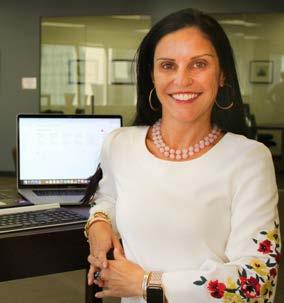
The SDCBA gratefully acknowledges the generous commitment of members who support our community at the Patron and Friend membership levels. You can become a Patron or Friend member when you activate or renew your membership online, or by request at any time. For more information about upgrading, please contact mbr@sdcba.org.
Patron and Friend member lists as of July 2024
Marc D. Adelman
Alicia Aquino
Danielle Patricia Barger
Hon. Victor E. Bianchini (Ret.)
Joshua A. Birdsill
Jedd E. Bogage
Tanisha Bostick
James A. Bush
Andy Cook
Steven T. Coopersmith
Ezekiel E. Cortez
Taylor Darcy
Warren K. Den
John A. Don
William O. Dougherty
Alexander Isaac Dychter
James J. Eischen Jr.
Matthew J. Faust
Sergio Feria
Nicholas J. Fox
James P. Frantz
Michelle Ann Gastil
Douglas A. Glass
Alvin M. Gomez
Stephen M. Hogan
Ted Holmquist
Emily Howe
A. Melissa Johnson
Stacey A. Kartchner
Carla B. Keehn
Laila Khosroabadi
Garrison "Bud" Klueck
Kevin Timothy May
Hon. William McCurine, Jr.
Jillian M. Minter
Virginia C. Nelson
Deborah A. Ortega
Anthony J. Passante
Frank J. Polek
Kristin Rizzo
Ana M. Sambold
Seana Kelly Scholtemeyer
Khodadad Darius Sharif
Elisabeth Silva
David G. Sizemore
Christopher J. Sunnen
Genevieve A. Suzuki
Cassandra C. Thorson
Bill VanDeWeghe
Thomas J. Warwick
Lenden F. Webb
Jon Webster
Daniel Weiner
Andrew H. Wilensky
Timothy G. Williams
Karen M. ZoBell
Pedro Bernal Bilse
James Gregory Boyd
Linda Cianciolo
Susanne de la Flor
David B. Dugan
Robert F. Egenolf
Mark Kaufman
Randall E. Kay
Ellisabeth "Lis" Logans
Philip John Mauriello
Valeria Medina
Anne Perry
Kristi E. Pfister
Michelle L. Silva
Hon. Stephanie Sontag
Peter B. Tentler
Michael A. Van Horne


My law school journey has come to an end, and I can now take time to appreciate the many wonderful experiences I had over the course of my matriculation through California Western School of Law (CWSL) as a student and as a member of the San Diego legal community. The last two years have been full of exciting challenges and engaging opportunities.
From the outset, I was determined to participate in as many networking opportunities as possible while remaining steadfast in my academic pursuits. I entered CWSL as a spring start in January 2022. Early on, I observed there was a need to mend and strengthen the social bonds of students who had been isolated as a result of the COVID-19 pandemic. By the summer of 2022, I had already held leadership positions in two of CWSL’s student organizations, the Black Law Students Association and the Cannabis Law Student Society. Through those organizations, I helped to create and organize many programs designed to increase students’ knowledge of and access to various fields of law and the attorneys and judges who practiced in those fields. I was able to gain the interest, participation, and support of students and alumni, not just at CWSL, but students at Thomas Jefferson School of Law and the University of San Diego School of Law as well.
Entering my 2L year, I sought to learn from attorneys in and around San Diego. I began to think about what I would do once I became a lawyer and an attorney. I wanted to know what my options were if I wanted to start my own practice, develop further in academia, or pursue a path toward the bench. To that end, I joined the Earl B. Gilliam Bar Association. Through the organization and its sister foundation, I was able to talk to many of the current and retired judges, who are members of the association and foundation, about their experiences toward a path to the bench. Additionally, I was able to meet and work with innovators and entrepreneurs within the legal field. For the duration of my fall 2022 term, I worked with the Talbert Law Office, where I was able to learn how attorneys are
integrating new technology into their practice to increase the efficiency of their practice and to observe how an attorney builds a new practice.
Having survived the ardors of the 1L term and after gaining practical experience in a new area of law through my internship, I focused my efforts on completing my goal of graduating early. CWSL’s faculty and staff were essential in helping me to achieve that goal. I was able to create a schedule that allowed me to take the maximum number of credits while improving my academic performance and gaining further practical experience. Without sacrificing the ability to take elective classes in the areas of law that most interested me, I was able to take all the Bar-recommended courses through the summer and took advantage of CWSL’s clinical externship program in the fall.
In my final trimester at CWSL, I was focused on professional development. Through the school’s clinical externship program, I was able to work for the Labor Commissioner’s Office, where I worked under three attorneys to write administrative law decisions, make my first appearances and arguments in court, and develop a strategic approach to pre-trial matters. This externship was easily my favorite part of law school because it was a window into the kind of work I want to do as soon as I become an attorney.
As I look back on the two years I spent in law school, I can say I truly appreciate the entire experience as well as the people who helped me see the possibilities that exist for me as a future attorney. I now turn my focus to the California Bar Exam and beyond to the many opportunities that will come with my legal career. I hope to one day give back to the San Diego community the support and guidance it so graciously offered me.
Tariq Blake is a Fall 2023 graduate of California Western School of Law. He is sitting for the July 2024 Bar Exam after which he will practice civil rights and employment law.
A recurring series where fictional characters discuss real ethics scenarios Macbeth, a long-recognized expert in legal ethics, professional responsibility, and the law of lawyering is joined by his nephew Duncan and Sara, the very bright newest member of the firm
Macbeth sat on the edge of the counsel table, his back to the bench — a young audience, some eager, some anxious, none bored.
“Good morning. I’m Macbeth. Thanks for inviting me to mentor your mock trial team. I look forward to working together.”
A hand goes up. “You a trial lawyer?”
“Yes. For many years. Now I focus most of my energy on legal ethics.” He gestures to his right. “The two lawyers in the jury box are Duncan and Sara.”
From the second row: “All of you working with us?”
“Sara and Duncan will lead. Duncan on opening statement and direct examination. Sara, closing argument and crossexamination. Both will help with trial briefs.”
“What’s your role?”
“I’ll help where I’m useful. In this courtroom, you’re lawyers. You’ll walk the walk, talk the talk. Treat each other as fellow lawyers. So, we’ll start by discussing lawyer ethics. As a mock trial team, you’ll follow lawyers’ ethical standards.”
Eyes widened.
“That little blue book contains the Rules of Professional Conduct. But before we get to specifics, let’s start with a question. What traits would you want to see in a lawyer?”
A tentative hand goes up. “Keep secrets?”
“Excellent. In California, we have a strict confidentiality rule. Strictest in the nation. You’ve heard of the lawyer-
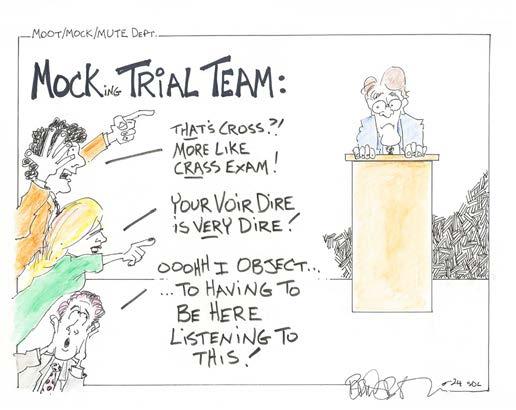
client privilege? Studied it to prepare for the team?”
Nods all around.
“Our confidentiality obligation goes a lot further than lawyer-client privilege. As important as that is.”
Some note-taking.
“It covers all information a lawyer learns representing a client. No matter where it comes from. If a client wants something kept confidential. Or if disclosing it would embarrass or be disadvantageous for the client, a lawyer can’t disclose it.”
Second row again: “Really? No exceptions?”
“Only one. If a lawyer believes a client’s about to commit a crime. And it will result in someone’s death. Or someone will be seriously injured. Then the lawyer may — doesn’t have to — tell as little as necessary to prevent the harm. Otherwise, our lips are sealed.”
A head shakes.
Another hand. “You mean I can’t talk about our team? What we’re doing?”
Macbeth surveys the group. “What do you think? A show of hands.”
All but one go up.
“May I ask if you disagree?”
“Not even my parents? My boyfriend?”
Giggles.
“Good questions. California lawyers can’t discuss confidential client information with anyone — even boyfriends. If the client wants it kept confidential, it’s confidential.”
A tentative nod.
“I’ll ask everyone. As team members, you’re acting as lawyers. Assume your team is your client. Should team information be kept confidential — no matter how hard that is?”
All hands go up.
“Terrific. Another ethical trait you want in a lawyer?”
Student sitting up front: “Loyal.”
“Good response. Loyalty is the core of the lawyer-client relationship. We have, for example, several rules dealing with conflicts of interest. Who can give us an example of a conflict?”
Front row again: “Representing opposite sides. Like in a case.”
“Perfect. A lawyer can’t represent clients with interests that are at odds. In other words, adverse. In a case or any representation.” Macbeth holds up one hand ticking off on fingers. “Unless each client agrees. After knowing all the facts. And in writing.”
More note-taking.
“Let’s discuss two more ethical traits before Sara and Duncan introduce their topics.”
“Handling money?”
“Another serious obligation. Lawyers often take care of clients’ and other persons’ money and property. We have ethical rules that prescribe how we must do it. Also, what we can’t do.”
A few hands started to thumb through the blue book.
“One more?”
“Smart?”
“Can we say competent?”
A shrug and a nod.
“Lawyers must act competently when representing clients. And diligently. For your team, that means doing homework. Attending practice sessions. Working with your team members.”
A few students exchanged nods.
“We’ll spend a few minutes at each meeting going through some of the rules you’ve just identified. Before we meet again, please read the rules in that blue book. Just once. Now, let’s hear from Sara and Duncan. We’re all here to prepare for trial.”
Editor’s Note: Working with mock trial teams helps shape the future of our profession, especially weaving ethical concepts into their trial preparation.

Edward McIntyre (edmcintyre@ethicsguru.law) is a professional responsibility lawyer.

ETHICS HOTLINE: (619) 231-0781 x4145
The SDCBA Legal Ethics committee is here to help! SDCBA members can call our Legal Ethics Hotline* for guidance and perspective on a variety of ethical considerations in the practice of law. Your call will be taken by a seasoned attorney with significant experience in legal ethics issues. Simply call the hotline and leave a message with your phone number, your question, and any context you can provide that can help our attorneys research your question before responding. One of our Legal Ethics Committee members will call you back to discuss your question with you.
*Before calling, please read the following disclosure: https://www.sdcba.org/docDownload/47105.






Privilege logs frequently produce disputes in eDiscovery matters. Often, they result from perfunctory or limited initial efforts by the parties to reach a binding agreement. Arguably, the parties have not adequately satisfied their responsibilities to their clients and their case preparation. However, the efforts made at the outset will save time, costs, and fees in the final analysis. The Sedona Conference undertook a comprehensive effort to reduce the number of disputes and just published the final version of its Commentary on Privilege Logs.1 Its 123 pages provide a substantial discussion of the format, timing, and other anticipated case issues that could be avoided by agreeing to a particular form of privilege law. The commentary also contains examples of particular formats in its appendices, with illustrations of sample documents showing how they might appear in a particular log. If you’re not ready to read all 123 pages, you can start with a two-page handout on the Sedona Conference website.2
Recent developments suggest little hope that small and medium businesses and law firms can avoid spectacular breaches of their data systems. If the largest firms cannot avoid hacks and ransomware demands, what chance do we have?
Though the AT&T breach occurred last year, it drew little attention then. The breach was substantial, involving the personal information, Social Security numbers, and email addresses of over 70 million AT&T customers.3 In late April of this year, AT&T sent its customers notices that some of their personal information had been compromised. Before you wonder why the notice was a year later, AT&T claimed it only learned of the breach in late March when the dataset was released on the dark web.4
TECHNOLOGY BY BILL KAMMER
Another example of a data breach at one of the largest technology companies was the recent discovery by Google that its crown jewel — the search algorithm — was also discovered on the dark web. Some 2,500 pages of the search documentation had apparently leaked, providing substantial information about how the search algorithm worked. The commentator Rand Fishkin posted a lengthy discussion on his SparkToro blog on May 27, noting the information and developments related to this breach.5
If that is insufficient news of recent breaches, consider the May 28 announcement that a Ticketmaster breach may have exposed the personal information of 560 million customers. The data reportedly includes payment details, names, addresses, and phone numbers. A hacker offered to sell 1.3 terabytes of that data for a single payment of $500,000, though that may only have been an effort to provoke a ransomware payment from Ticketmaster.6
Lesson learned: a probable need for a cyber insurance policy providing sufficient coverage. No need to emulate UnitedHealthcare, which had no insurance and paid ransomware of $22 million.7
“AI washing” is well underway. Everyone seems to have an AI-enhanced product that law firms or lawyers should purchase. Lawyers may not be the most informed purchasers of technology solutions, but there are common questions they should always ask. This is particularly true with vendors and contractors who suggest that their GenAI product will assist or automate everyday tasks. Logically, lawyers should be concerned with security, accuracy, and privacy. Several recent commentators have suggested that there are three basic questions to ask every vendor offering a proposal: How do you get your data?; how do you maintain your model?; and how can you guarantee that my data will not be compromised or used to train a model?
Working through these questions will guide a potential purchaser of any solution to an appropriate answer.8
These are not trivial concerns. Take the collaboration platform Slack, which has over 30 million active users daily — who reads its shrink wrap? You may recall consenting to its use of your customer data, including messages and files, to train its machine language models. Many will not. The issues are more complicated than this simple example, but the news should condition us to insist on answers to these critical questions.9
Microsoft recently announced Recall, a signature feature of the next-generation Microsoft Copilot+ PCs. Although hands-on experience is lacking, Recall promises to help users locate a previously reviewed contract with a particular term, a website recently visited, or an email vaguely remembered. These are common concerns, and AI might provide solutions. But to a first-time purchaser considering the product for a law practice, Recall provokes the same GenAI questions: Where is that data located?; is it on my system or in the cloud?; and how far back does that data go? Despite some early comments that suggested there was no reason to be concerned, others suggest there may be a good reason. Recall may store all the collected data on your computer in unencrypted form, making it a soft target for hackers. The debate and the
suggested fixes and cures will probably continue in the coming months.10

Bill Kammer (wkammer@swsslaw.com) is a partner with Solomon Ward Seidenwurm & Smith, LLP.
Sources:
1. https://url.us.m.mimecastprotect.com/s/1BOVCgJ8WKTADpyxcoTh1 e?domain=thesedonaconference.org
2. https://thesedonaconference.org/file/7392/ download?token=S5ArLJQp
3. https://url.us.m.mimecastprotect.com/s/f8E2ClYXWLc2jpE5i1Sa6H? domain=therecord.media
4. https://todaysgeneralcounsel.com/att-faces-putative-class-actionfor-data-breach
5. https://url.us.m.mimecastprotect.com/s/mgZtCn57WXS7kjDqhpk3n A?domain=sparktoro.com
6. https://www.howtogeek.com/ticketmaster-breach-may-2024
7. https://url.us.m.mimecastprotect.com/s/mLZKCqx6W5T8VlNPTpIZ Fx?domain=todaysgeneralcounsel.com
8. https://todaysgeneralcounsel.com/tips-for-vetting-vendors-aboutgenai-solutions-for-legal-ops
9. https://url.us.m.mimecastprotect.com/s/48MCCxk8W5U1zwv4cN06T?domain=complexdiscovery.com
10. https://www.malwarebytes.com/blog/news/2024/06/microsoftrecall-snapshots-can-be-easily-grabbed-with-totalrecall-tool
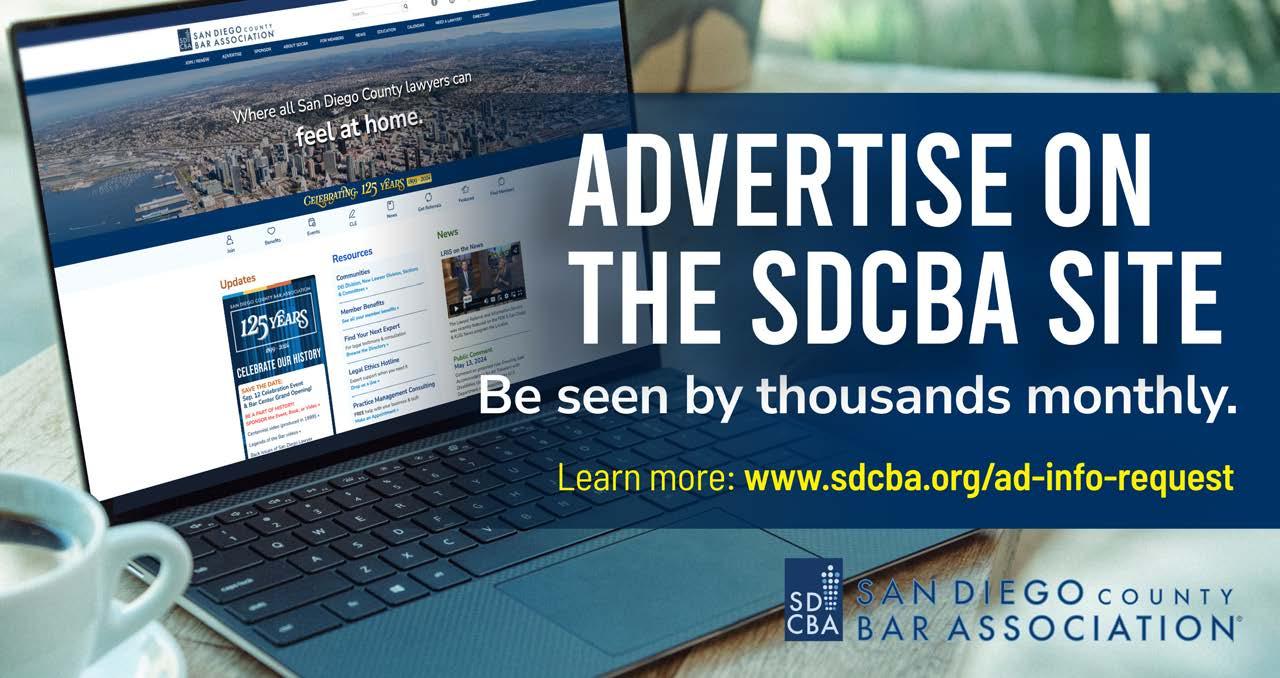
by BRIAN P. WORTHINGTON
Many lawyers dream of that one contingency case that gets them the house in Aspen, a Ferrari, or even the security of never needing to earn a paycheck again. In reality, few lawyers ever find that case. Contingency cases can nevertheless present lucrative opportunities on top of the fulfillment of helping clients who have truly been harmed. Several considerations may make the difference between realizing those lucrative opportunities and spending valuable time for little or no recovery.
First, assess your risk-tolerance level. If financial stability is a high priority, contingency cases may not be for you, or at the very least, you may need to consider only those cases involving less risk of no recovery and less chance of Ferrari-level payouts. Big risk-takers might be better suited for higher-value cases, but they should still be smart about which risks they decide to take. Even with all the other considerations, everything comes back to your risk-tolerance level.
Second, evaluate the client’s liability case. A case where liability is clear presents less risk than where liability is truly disputed, and the fight may be more over how much your client wins rather than if the client wins at all. The amount at stake might affect this evaluation. A case of questionable liability where the fee might max out at
$30,000 may not be worth taking. But if the contingency fee could, for example, exceed $1 million, you might be more willing to roll the dice on liability.
Third, before accepting the case, evaluate the client’s damages objectively and realistically. It can be easy to see the evidence and arguments supporting a large damages award that, if obtained, would make the case worthwhile to take. However, many lawyers fail to thoroughly examine the weakness of the damages case and the effective arguments defense counsel might succeed in making. If necessary, consult your lawyer friends, who can be more objective, in case they see weaknesses you might be missing. If you don’t evaluate your damages case honestly and objectively, you may end up devoting substantial time to the case, only to obtain a recovery that does not reflect adequate compensation for your time spent.
Fourth, assess whether a judgment can actually be recovered. A large judgment does no good to the client or the lawyer if it is never paid. Try to determine if the defendant has insurance with sufficient coverage limits. If the limits are not sufficient, but you plan to make a limits demand to open the policy and recover the entire judgment from the insurer, make sure you have a
strategy for that and know what’s involved in doing that. Also, make sure you and the client are prepared if the insurer accepts that limits demand. If the defendant has insufficient insurance, assess whether that defendant has assets sufficient to cover the judgment. Assess whether the defendant might be able to discharge the judgment through bankruptcy, and assess the time and steps needed to seek out the defendant’s assets to enforce the judgment.
Fifth, consider the costs you’ll need to advance. Deposition transcripts commonly exceed $1,000. Expert witnesses are expensive and yet typically necessary — consider your experts as well as the cost of deposing the opposing experts. Even in smaller cases, you may need to go out of pocket to advance those costs. In larger cases, costs can range from $50,000 to $250,000 or even more. Do you have the cash to advance these costs? If not, are you willing to mortgage your house? Are you able to mortgage your house? There are litigation financing companies that can help with costs, but they pose challenges as well.
Lastly, know your limitations. The bigger the case, the harder the defense will fight. In cases with large damage claims, you will face discovery disputes, summary judgment motions, and even appeals. You might take a mean deposition and might be a wizard with a jury, but if your research and brief-writing skills are mediocre or less, you risk losing. If necessary, find attorneys whose strengths complement your weaknesses in these matters. You will also likely face voluminous document productions where you have neither the time to review them all nor the ability to digest the materials without help. Bring aboard a qualified paralegal. While this might reduce your ultimate recovery, it may ultimately net you a bigger recovery than if you don’t. The most successful people surround themselves with those who bring talent to every aspect of the endeavor. In other words, assemble your best team.

Brian Worthington has operated a solo practice for 12 years, having previously been a partner at two San Diego law firms for over 17 years. While Mr. Worthington handles a wide array of civil litigation, his practice currently focuses primarily on civil appeals and insurance coverage/bad faith law.
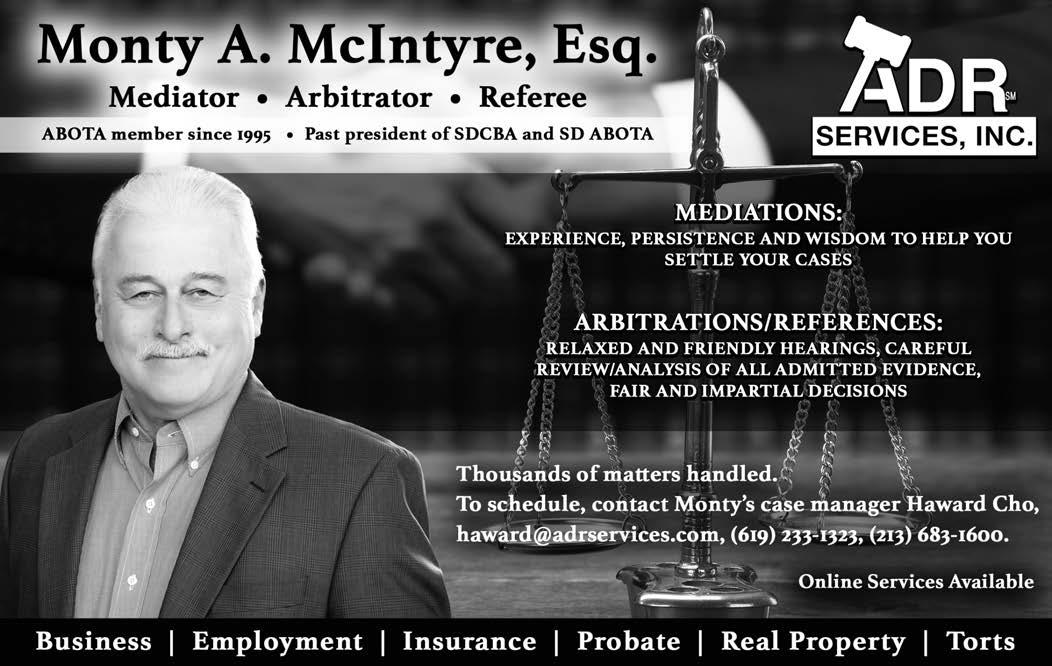
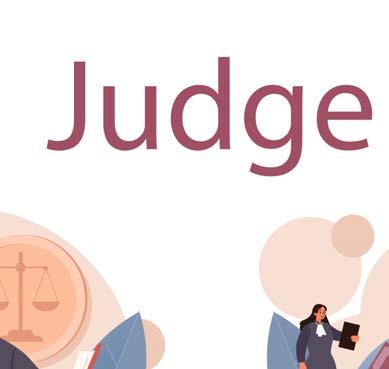
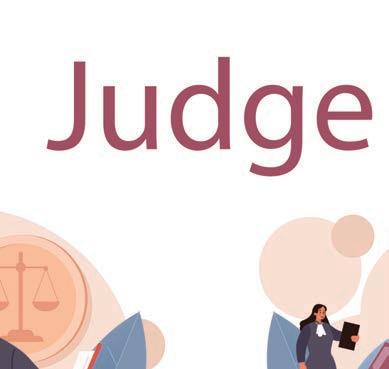
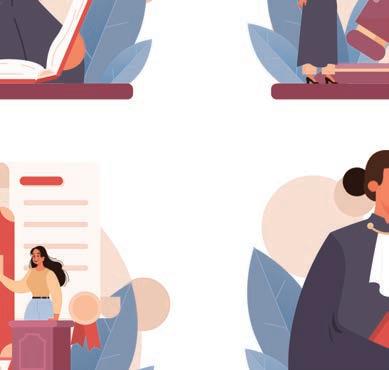
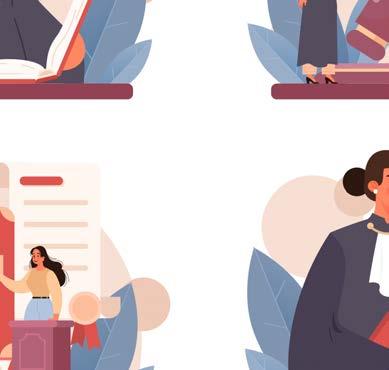
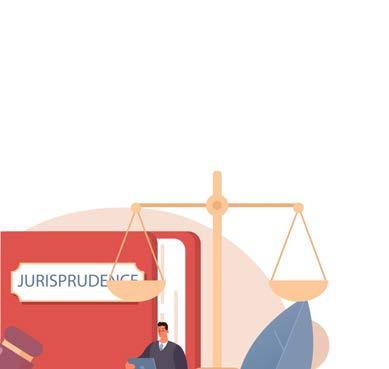
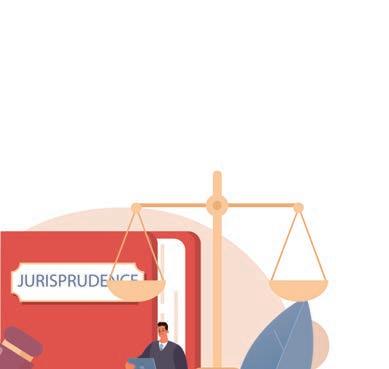
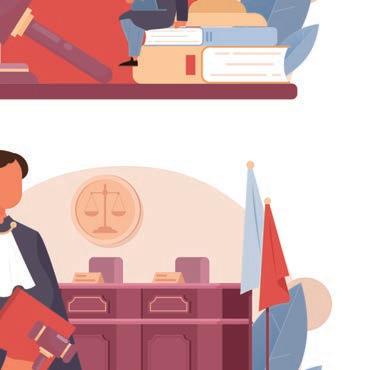

By Koryn Sheppard
f you had asked me before November 2023 if I saw myself running for an elected office, I would have probably said “no.” I had not pictured myself as a candidate. Reflecting on my journey, I realize the importance of sharing the lessons learned to illuminate the path for future candidates.
The most crucial lesson is the power of having a true north. It is a vulnerable experience putting yourself out there. Your “purpose” for running is the guiding light that anchors you amid challenges. Your true north should be woven into your stump speeches, endorsement applications (there will be many of both), and candidate statement. Your true north will resonate with voters.
My true north carried me through the harrowing moments as I faced questions about my qualifications. While seeking endorsement from the County Bar Judicial Election Evaluation Committee, I received anonymous personal attacks designed to derail my campaign. My true north gave me the strength and courage to persevere and see my journey through personal setbacks and a bruised ego. Even under the shadow of defeat, my true north shined as a light, enabling me to remain positive.
The best time to get involved in the community you hope to support your campaign is now. Join bar associations, attend affiliation bar events, and meet people outside your practice area. This is great professional networking and will help raise campaign awareness when you decide to run. Actively seek volunteer opportunities and leadership
positions within the legal community. Participating as a pro tem or arbitrator demonstrates your commitment and expertise. Meet community and political leaders and attend relevant meetings and events to establish yourself as knowledgeable and involved.
Running for Judge involves practical financial considerations. Candidates must take an active role in raising campaign funds, as donors want to hear directly from the candidate. Judicial candidates must file a Declaration of Intention, designating the judicial seat they are pursuing. This filing incurs a $2,323.99 non-refundable fee. Alternatively, candidates may gather 1,000 signatures in place of paying the fee. Additionally, candidates must collect between 40 and 60 signatures for their nomination.
Judicial races are countywide. The candidate stetement fee, calculated based on the number of voters in the district, is $18,353.99. This statement, a concise 200-word pitch to voters, is a crucial introduction to the campaign platform. (Candidates will also select up to three words, the most important three words of the campaign, as a “Ballot Designation.”)
Candidates must establish a campaign website and produce marketing materials such as cards and flyers. Attending events is essential, entailing costs for admission, parking, refreshments (bring water and snacks everywhere), and gasoline. Union-created campaign signs and digital marketing cost a minimum of $10,000. A campaign team, including professional consultants, managers, and fundraisers, all require compensation.
Raising awareness in a county of 3,345,000 people and 4,526 square miles (an area larger than Rhode Island or Delaware) presents a challenge for judicial candidates. Meeting every voter personally is infeasible. Candidates must raise funds to reach voters. Voters told me that they simply do not know anything about the candidates, so they do not vote for judge. This underscores the importance of securing endorsements from respected judicial officers, law associations, community groups, and political organizations. Start early to secure endorsements, as they boost your name recognition, and your competitor may seek many of the same endorsements.
Running for Judge presents a paradoxical need for political party support despite the nonpartisan nature of judicial races. Candidates cannot indicate their party affiliation in their candidate statement. Endorsements from notable persons can hint at a candidate's party leanings. For this reason, some candidates elect to mention politically recognizable endorsers in their candidate
statements. Many voters mentioned that endorsements did not sway their vote favorably but instead dissuaded them from voting for a particular candidate. Wisely select the endorsements you list in the candidate statement.
Local political groups serve as crucial sources of backing for candidates. These groups may not overtly endorse or donate to a candidate who is not a party member, even if they identify as Independent. Political groups inquire about a history of non-party affiliation. To garner support in the campaign, it is best to have already been a registered party member. While many of these groups grasp the ethical constraints barring judicial candidates from making political statements, not all do. Be prepared to frequently and tactfully explain the restrictions throughout the campaign.

Koryn Sheppard has practiced family law for over a decade. She is a Board Certified Specialist, owns her own practice, and is an adjunct professor at Thomas Jefferson School of Law. Ms. Sheppard earned her Juris Doctorate from California Western School of Law and her Bachelor of Arts degree in Philosophy from the University of California, Los Angeles.




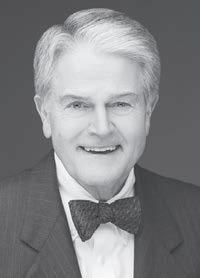
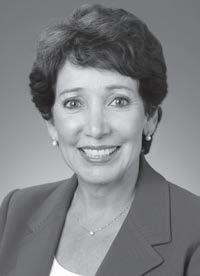
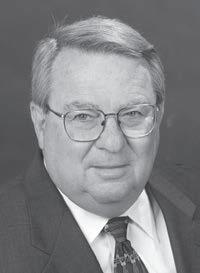

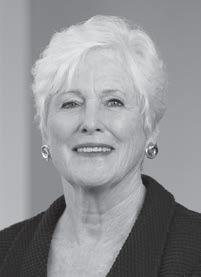
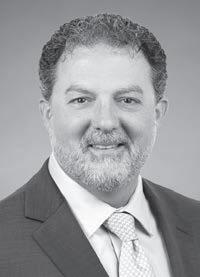
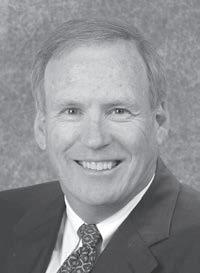
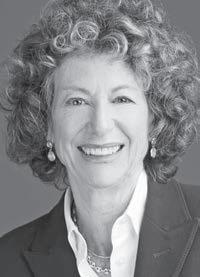

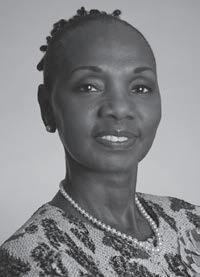
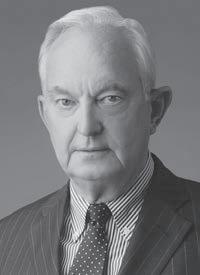


came to the law circuitously. I didn’t always want to be a lawyer — although I did enjoy “Perry Mason” on TV as a child. I was, however, always ready to argue when I spotted an injustice, particularly with my father (usually about why what I wanted to do or had done was perfectly appropriate). I was frustrated when those spirited discussions ended with my father stating, “This discussion is at an end.” Years later, I learned that this invariably meant I’d argued my father into a corner.
I put my innate refusal to back down to use in disputes with my peers and sometimes my teachers. One occasion I recall with fondness was being caught ditching school in eighth grade with my best friend, Patty. We were caught by the school counselor, who ordered us into his car and drove us back to campus, lecturing all the way back. His ire was fueled in part because we were both wearing Levi’s, which were forbidden for girls to wear on campus in those days. When I (helpfully) pointed out that we had never intended to be on campus wearing the forbidden garments and this transgression only occurred through his intervention, he was not impressed.
My mother taught me the joys of gardening, and I loved growing plants in our yard. I was introduced to landscaping during high school and attended horticulture courses at Mesa College and Cal Poly. I was impatient to get on with my life and actually work in my chosen career, so I left school before completing my degree, returned to San Diego, and obtained my California State Contractors’ license.
Recognizing I needed to complete a degree, I returned to school, attending San Diego State and later University of Redlands, where I finally completed a degree in Business Administration. I decided to continue my education, and one of my friends (who was a lawyer) suggested that I consider law school instead of an MBA, which I did.
I was originally interested in using my credentials as a licensed contractor to work in construction defect law,
but by the time I took the bar exam in December 1994, the construction industry had slowed. So, I embarked on a career in business law, including working with a law school classmate on limited scope civil litigation matters, which I enjoyed greatly.
My business clients asked me to create estate plans for them to hold their interests in their newly created entities. Because I was still a relatively new attorney, I was still practicing “door law” (any potential work that came through the door was of interest). I assured them I could absolutely draft estate plans and then set out to learn how.
I found I liked trusts and estates, which led me to file my first probate administration case. I discovered that I very much liked being in probate court, where my new colleagues were collegial and willing to help the new kid learn her trade. My practice expanded into trust administrations, conservatorships, will and trust disputes, cases involving financial elder abuse, and ultimately serving as a mediator to help resolve these disputes.
As I gained experience and improved my skills as an attorney, I found I also enjoyed mentoring young lawyers — giving back what I received. I’ve also been privileged to assist the probate court as a pro tem judge, settlement conference officer, court-appointed attorney in conservatorship cases, guardian ad litem, and member of the Probate Bench-Bar committee. Although my path to the law had some twists and turns, I’m happy to be where I am today and look forward to many years to come.
Merrianne E. Dean, Esq. has more than 25 years of courtroom experience litigating probate and trust disputes, financial elder abuse matters, and conservatorships. Ms. Dean has been active in the San Diego legal community for her entire career. She has served as a co-chair for the Probate Section of the San Diego County Bar Association, is a co-founder and Director for Probate Attorneys of the San Diego County Bar Association, a member of Lawyers Club, a member of the Tom Homann Law Association, and a Mediator at West Coast Resolution Group on trust and estate matters.

Hon. Keri G. Katz ( Ret.)
Signature Resolution welcomes Hon. Keri G. Katz (Ret.) to our panel of neutrals, specializing in a wide range of civil matters, including commercial, government, and construction litigation.
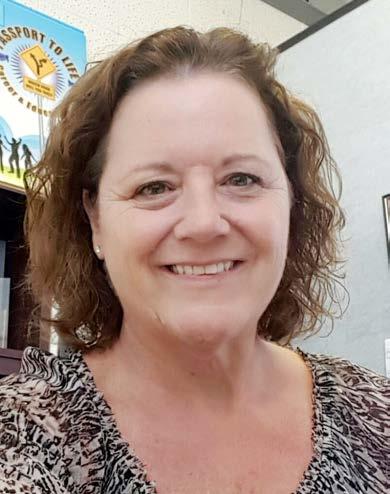
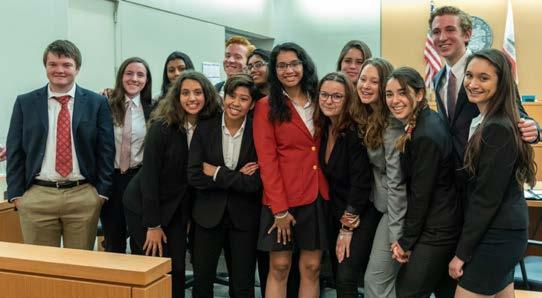
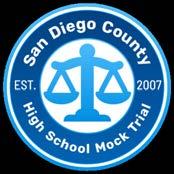
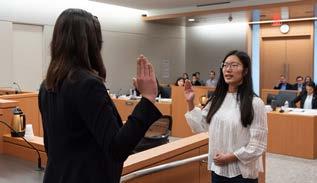


By Ron Marcus
Irecently had the chance to sit down with Julie Myres, who had just retired from her 36-year run at the Superior Court in San Diego as Community Outreach and Education Program Manager. I had worked with her for the past five years as the SDCBA’s liaison to the San Diego County High School Mock Trial committee, led by the Superior Court, and I wanted to get her reflections on the Mock Trial now that she was newly retired.
But to simply use the word “managing” doesn’t do Julie justice. All of the community outreach programs put on by the Court — designed to teach students and the general public about the inner workings of the judicial system — were either programs that had gone dormant and were resurrected by Julie, requests from judges or schools that Julie took on and ran with, or were conceived by Julie herself — all of which were popular and successful. Her outsize efforts earned her the SDCBA’s “Distinguished Citizen” community service award in 2010.
Each new court program started this way: once Julie got one program running over a period of time, she would invariably get bored with running it, which would lead her to wonder, “What’s next?” With her tact and power
of persuasion, she would get the green light to build and manage a new program with her team. In that way, she charted her own career path within the Court — essentially writing her “choose your own adventure” story.
But, the program I sat down with Julie to discuss, one that would, for me and many others, define her legacy at the Court, is the Mock Trial program.
In the bustling halls of San Diego's courthouse, a unique transformation occurs each year. Courtrooms that usually host real-life legal dramas become stages for high school students to step into the shoes of attorneys and witnesses. This is the San Diego County High School Mock Trial program, a testament to the power of experiential learning and community engagement.
Julie has stood at the heart of this program's success. Under her guidance and management, the Mock Trial program grew from humble beginnings to become one of the largest and most impactful in California.
"It all started with a conference call," Julie recalls. The Constitution Rights Foundation, which is now called Teach for Democracy, was overseeing the organization
of the Mock Trial program in California. "They were pitching this program. They wanted San Diego to do it. Judge Einhorn looked at me and said, 'Well, okay.' And that's how it was born in San Diego." From that simple affirmation, Julie and a dedicated team of stakeholders began crafting what would become a cornerstone of legal education for San Diego high school students.
Now entering its 19th year, the program has enjoyed steady growth. "First year, there were four teams. The next year, there were eight teams, and then it just kind of went from there," Julie explains. By 2024, the program had expanded to include 38 teams, involving hundreds of students across the county.
Ensuring the success of a program of this magnitude is a massive undertaking. Critical to that success is recruiting coaches for the student teams. Julie and her team developed an effective system for matching attorney coaches with schools, considering factors like geographic convenience and legal specialties. "Ideally, you have a civil attorney, a public defender, and a district attorney. That's the dream team," she notes.
The impact on students has been profound. Julie identifies three key benefits: "Number one, confidence, by far. Number two, public speaking skills. And three, the friendships they form." These benefits extend far beyond the courtroom, preparing students for success in whatever path they choose.
But the program's influence reaches beyond the students. It has become a bridge between the legal community and the public, fostering understanding and respect for the judicial system. As Julie puts it, "It's a ripple effect.” For every child that participates, “...who knows how many other people learned about what we do [in the judicial system] based on what that kid saw?"
The success of the Mock Trial program is a testament not only to the eagerness of students, teachers, and coaches who participate every year, but also to the support it receives from the court system. "Our administration and our presiding judges were always 150% supportive," Julie emphasizes.
The program's resilience was put to the ultimate stress test during the COVID-19 pandemic. Rather than canceling, the program pivoted to a virtual format in
2021, coordinating 30 teams in online "courtrooms." This adaptability ensured that students didn't miss out on this valuable experience, even as the world was missing out on so many other things while under quarantine.
As the program has grown, so has the success of its participating student teams. This year, for the first time, a San Diego team placed second overall in the State Finals. That team, from Torrey Pines High School, bested nearly 35 other schools in the Finals. This is the realization of a dream 18 years in the making. And the program is only getting started.
The success of the Mock Trial program is a testament not only to the eagerness of students, teachers, and coaches who participate every year, but also to the support it receives from the court system.
As she reflects on her time managing Mock Trial and other popular programs, Julie clearly remembers a particular incident that has since reinforced her strength to persevere under the heaviest of workloads and tightest of deadlines. She was standing in one of the hallways of the courthouse one day, waiting for one of the judges, when Judge Einhorn came into the hallway and said to her, “You know what? You make us look good.” That one sentence changed everything for her. She explains, “That carried me through a lot of really exhausting times when I would think about it, and I thought, well, if he believes that, then I’m going to make it happen."
Julie had three mantras that guided her over the past 36 years. “One of them, first and foremost, was always, I'm just going to keep doing what I do until somebody tells me to stop. Not once did anybody tell me to stop. The entire time I was there. My second one was that we had to make sure every time, every tour, every event, every day that kids came into our court or our judges went out to schools, we had to make sure it was the best it could be. Because we're only going to get them once. We're only going to have that opportunity one time.”
The third mantra? “Be respectfully and politely bold.” Meaning, be bold, but do it with the utmost respect to everyone, “Because everybody has a role.”
As the Mock Trial program continues to evolve, its legacy is secure. It has become a model for other
counties, demonstrating how the legal community can engage with and inspire the next generation. More than just a competition, it's a window into the workings of justice, a training ground for future leaders, and a bridge between the courthouse and the classroom.
As Julie contemplates her retirement, her legacy is just as secure. For me, and I’m sure, many, many others, Julie will always be associated with, and indeed, revered for, being instrumental in the success of the San Diego County High School Mock Trial program.
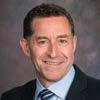
Ron Marcus (rmarcus@sdcba.org) is the Director of Marketing & Public Outreach at the San Diego County Bar Association and has served on the San Diego County High School Mock Trial Committee since 2019.
By Isaac Jackson
For three years, La Raza’s Trial Advocacy Program (TAP) has been working with schools from traditionally underrepresented neighborhoods in San Diego, making it possible for those students to compete in San Diego County’s High School Mock Trial Program. Helmed by Deputy District Attorney Hector Jimenez, TAP seeks to provide resources to schools that otherwise may not be able to participate in the competition. TAP currently supports mock trial programs at Crawford, King-Chavez, Lincoln, Oceanside, Southwest, and Sweetwater high schools, which include around 180 students per year.
As TAP Program Coordinator, Hector ensures that these schools have attorney coaches, funds to cover competition expenses, and even suits for the students to wear during the competition. The program is made possible by donations and fundraising by the La Raza Lawyers Association, grants, and support from other organizations, including the Earl B. Gilliam Bar Association, District Attorney’s Office, Pan Asian Lawyers of San Diego, Public Defender’s Office, and Southwestern Community College.
Hector, a longtime mock trial coach for La Jolla High School, was inspired to develop TAP after observing that the participating schools were predominantly from more affluent neighborhoods. Hector also noticed that schools from underrepresented neighborhoods often did not wear suits like other competitors. To help close this gap, Hector set out to find high schools willing to partner with him to help build new mock trial programs or enhance programs already in place with more resources. Soon after, TAP was born.
TAP has worked with the San Diego High School Mock Trial Committee, which has made many efforts to recruit schools from all areas of San Diego County. Hector is thankful for the Committee’s support. He is also thankful to work in a county that has so many volunteers, committee members, scorers, judges, and coaches who are dedicated to enhancing these students’ lives through the Mock Trial program.

Isaac Jackson (isaac.jackson@sdcda.org) is Deputy District Attorney with the San Diego County District Attorney’s Office.
By George W. Brewster Jr.
Local legal organizations have long sought volunteers to help judge students participating in a courtroom exercise. But is the exercise a moot court or a mock trial? By definition, a mock trial is a full trial (usually condensed) with a judge, witnesses, parties, and possibly jurors. A moot court is an appellate argument before one or more pretend judges. Let’s take a look at a few local programs — this is not an exhaustive list by any means, and there is no slight intended if a law organization is left out.
The San Diego Chapter of trial attorneys and judges has partnered with Morse High School (Southeast San Diego) for a multilayered approach to mentoring. Members (including several Morse alumni) speak to the students about legal careers in monthly special (voluntary) assemblies. One of the key components of the presentations is encouraging students to focus on their goals and ignore those who say they cannot succeed or achieve those goals. Each speaker is asked to discuss their journey and emphasize the obstacles and adversity they had to overcome.
The Chapter also sponsored a teacher from Morse High School to attend an ABOTA Foundation Civics Summit in Washington, D.C., this summer. The teacher, Maria Miller, who was also selected as the 2024 San Diego Unified School District High School Teacher of the Year, was one of only 40 teachers selected in the U.S. to attend the all-expenses-paid event.
As for trial competition, Chapter members oversaw the first Oral Argument competition (with cash prizes) for Morse students in May 2023; these events (using a given fact pattern with students tasked with giving a closing argument) are held twice a year. This competition led to the formation of the first Morse Mock Trial Team, which hopes to compete against other high schools in 2025. ABOTA attorney members have volunteered to work as coaches, and Morse teacher Maria Miller is working closely with the ABOTA volunteers to get the mock trial team off the ground.
According to Jim Lance, the 2024 ABOTA San Diego President, Morse High School was identified as a school in need because students do not have the resources available at more affluent schools. Morse has approximately 1,800 students, with a 97% minority enrollment; 72% of the students are economically disadvantaged.
Lance noted that Morse students have few opportunities to obtain information, guidance, or mentoring regarding legal careers. His goal is to meet that need and to develop confidence and communication skills through oral argument and mock trial competitions.
The 40-year-old, 300-member nonprofit defense attorney organization is holding its annual Mock Trial Competition Nov. 7–9, 2024. The SDDL was founded in 1984, and the mock trial program began in 1990. According to its quarterly newsletter “The Update,” the competition “is a showcase event” for SDDL, and involves approximately 20 law school teams from around the U.S. The competition has two initial rounds over two days, followed by semi-final (top four) and final (top two) rounds. Each round is “tried” before a threejudge panel, with a trial judge (sometimes an actual sitting judge) presiding and making evidentiary rulings.
Kaitlyn Jensen, an attorney at Haight Brown & Bonesteel, member of the SDDL Board of Directors, and the 2024 mock trial committee chair, said the three-panel judges will sit in the jury box and participants will try their cases to the panel as though they were jury members (without voir dire).
Jensen said panel members are frequently surprised by how much they learned about trial practice by watching the student competitors, and everyone was looking forward to this year’s event after the pandemic hiatus. She said the pandemic caused a three-year pause in the competition, so technically, this is its 31st year.
Jensen felt that the competition remained strong because of the blend of local and national schools, although local schools are given an early heads up about the competition sign-up deadline. After that, it is open nationally with a 20-team limit (and a maximum of two teams per school). After the initial or preliminary rounds, awards are given for best opening, direct, cross, and closing, and for best overall. Jensen said this allows outstanding presentations by individuals to be acknowledged, even though their team may not have moved into the semi and final rounds. Trophies for first and second place overall are also presented at the end of the competition, with the trophy exhibiting a new San Diego-themed design.

George W. Brewster Jr. (sandbrews@aol.com) is a retired attorney after 35 years of practice, including JAG, private practice, and the last 30 with the County of San Diego, Office of County Counsel.
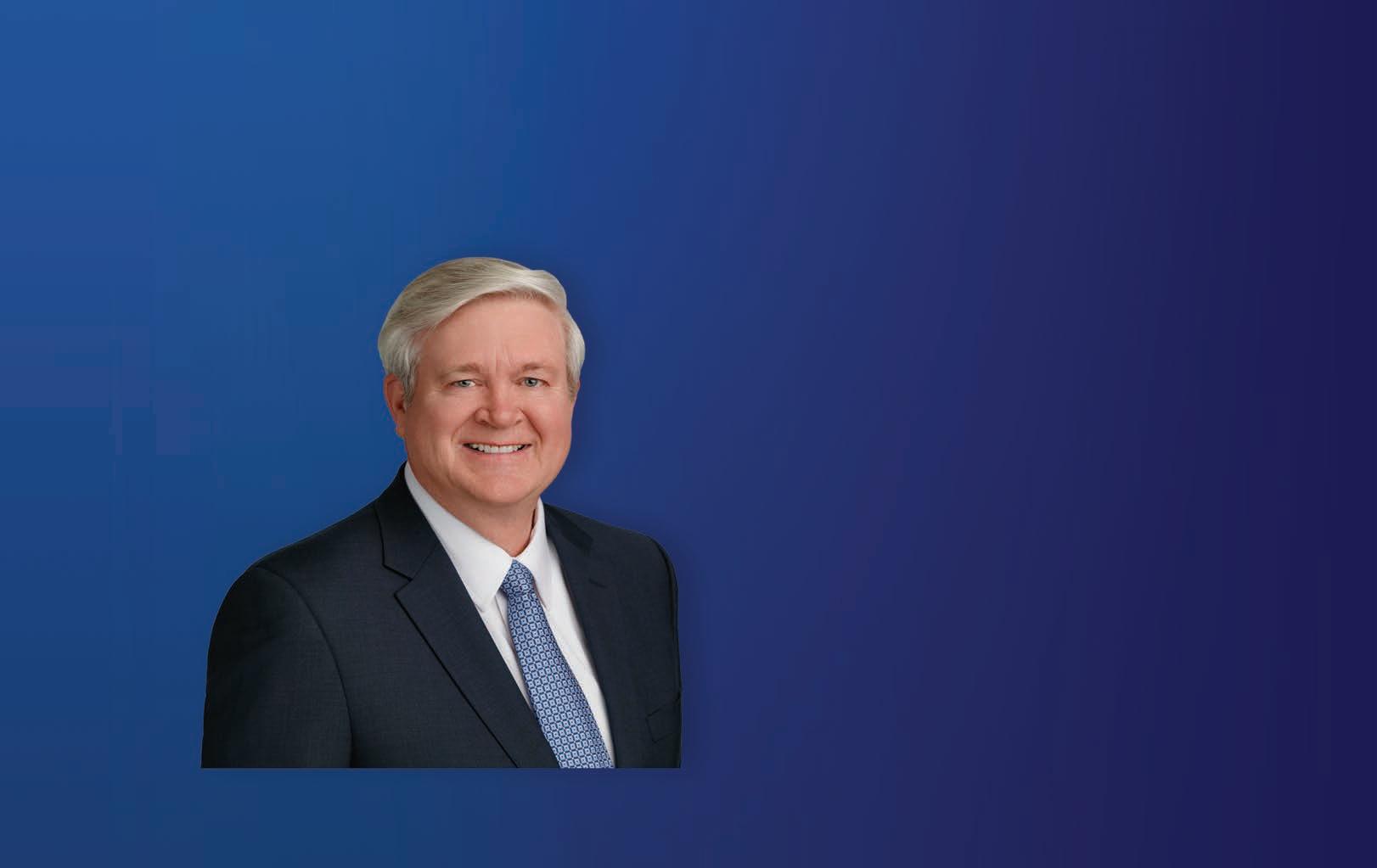

The San Diego County Bar Association produced its third elite cohort of lawyer-leaders with its 2024 Leadership Academy. The Academy is one-of-a-kind in California, offering a unique leadership program for attorneys. In its three years, the Academy has produced 51 alumni from over 30 distinct firms, nonprofits, and government agencies.
From January through June 2024, 15 SDCBA attorney members (“scholars”) immersed themselves in eight fullday sessions. Each session offers an intense day of learning, including subjects such as empathy, listening, purpose, vision, mindset, team building, recruiting, and conflict management. The sessions provide opportunities to learn practical skills from diverse faculty who hail from a wide array of practice areas and professions, including community and legal leaders.
The Academy’s eighth session is a specially designed capstone project dedicated to access to justice. The 2024 scholars served as an informal advisory group to the San Diego Homeless Court, focusing on the unique Pop-Up Resource Fairs. Capstone faculty responsible for the Pop-Up Resource fairs provided guidance to the scholars early in the day, which ended with presentations by the scholars to improve access to justice. In the days following the capstone project, scholars’ ideas were shared with the team of people supporting the Homeless Courts and Resource Fairs, creating a direct impact in our community.
The Academy held graduation at California Western School of Law. This celebration began with a welcome video message from Attorney General Rob Bonta to the scholars. Shirley Weber, Ph.D., California Secretary of State, gave a heartening Keynote Address that inspired everyone to lead. Graduation also included the Academy’s second Networking-in-Action (“NIA”). Led by past SDCBA President Johanna Schiavoni, NIA required scholars to share their leadership goals with the audience, who then offered advice, introductions, and other assistance to help scholars advance their goals. NIA demonstrated not only how scholars invest in our community but also how our community invests in them.

By Megan Moore
The Academy does not end at graduation. To advance scholars’ goals and enhance the continued impact of the Academy, alumni can participate in Mentorship Connections, a post-graduation support that pairs scholars with mentors particularly qualified to help the attorneys progress toward their unique vision and purpose. Current mentors include sitting judges, attorneys in private practice, nonprofit leaders, in-house counsel, and San Diego City Councilmembers, all of whom have graciously volunteered their time to guide our scholars toward success.
This Academy provides an inspirational and personal journey for its scholars. All alumni continue to advance the goals of the Academy: training attorneys as effective, ethical, and service-oriented leaders; increasing the diversity of leaders in the profession and the community; fostering relationships among attorneys from a broad segment of the community; inspiring attorneys to seek leadership roles that are meaningful to them; and building a support community to assist these attorneys in achieving their leadership goals. Scholars describe the experience as unexpected and transformational, with one 2024 Scholar already achieving their goal to serve on a board. The SDCBA is proud that the Academy is a catalyst for leaders to turn their passion into action.
The Academy could not function without the dedication and support of the SDCBA’s internal team and the volunteers on the Academy Subcommittee. This year, staff and volunteers navigated unique challenges while the Bar Center was under construction. To that end, the Academy owes a special thanks to the San Diego Law Library, which generously donated its space for all of the Academy sessions.
Please enjoy the testimonials from our 2024 scholars about their journey through the Academy and updates from alumni from our 2022 and 2023 cohorts. Without a doubt, these leaders continue to lift our community, embodying the Academy’s core values of authenticity, courage, curiosity, and accountability.
Have you been searching for ways to accelerate your leadership development, or are you seeking to realize new leadership roles in the community? You, too, can benefit from the tools and connections the Leadership Academy provides to help you live out your goals. Contact Megan Moore, Chair of the Leadership Academy Subcommittee, at megan@meganmooreinc.com if you want information about the 2025 cohort.

Megan Moore is the Chair of the SDCBA Leadership Academy Subcommittee, Member at Large of the DEI Division, and member of the Wellness Subcommittee. She is an attorney and certified professional coach who works with lawyers and firm leadership teams to identify and achieve what matters most to them and their organizations. Visit https://meganmooreinc.com to learn more about her coaching and consulting work.
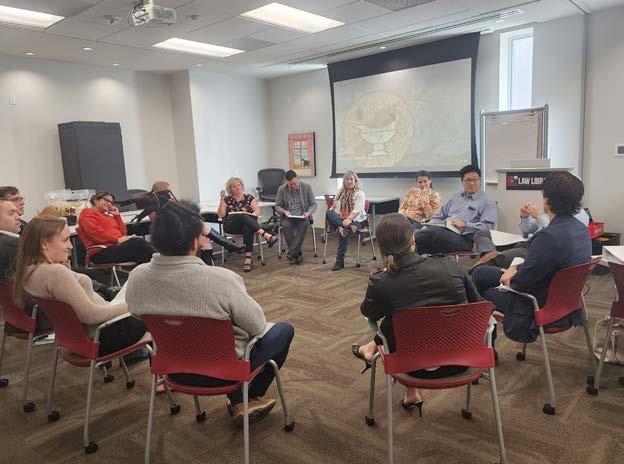
Leadership Academy Subcommittee:
Megan Moore, Chair
Anna Romanskaya, Vice Chair
Nicole D’Ambrogi, Board Member
Jason Evans, Board Member
Nicole Heeder, Board Member
Stephanie Pengilley, Board Member
Rachel Allums
Maria Chavez
James John Eischen, Jr.
Kelly Gemelli
Lucas Hirsty
Patrick McGill
Katie Parker
Johanna Schiavoni
Seana Scholtemeyer
Phillip Stephan
Namita Thakker
SDCBA Internal Team:
Sarah Harris
Nancy Milazzo
Stephanie Watson
Jessica Larson
Ron Marcus
Nicole Behar
Attiba Royster
Katelynn Robinson
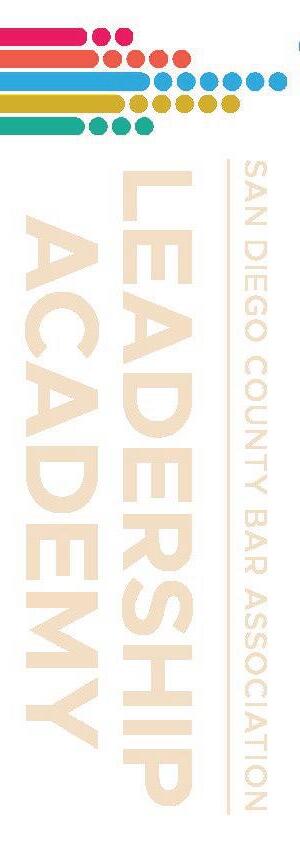


Sofya Asatryan Associate Sheppard Mullin Richter & Hampton LLP
Reflections: “I moved to San Diego from Los Angeles two years ago and struggled to build a strong professional network here I joined the SDCBA Leadership Academy to meet other like-minded legal professionals in town The program encourages people to be open, authentic, and vulnerable which is the perfect recipe to making new friends Plus, there’s so much value in witnessing your peers develop as leaders ”
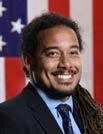
Bobby Case Staff Attorney
Legal Aid of San Diego
Reflections: “The Academy Facilitators, Staff, and Guest Speakers all made us feel comfortable exploring our authentic selves in pursuit of honing our individual leadership styles This was truly a great experience ”
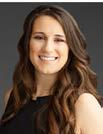
Leah Gonzales
Deputy Public Defender
San Diego County Public Defender
Reflections: “I thought the Leadership Academy was a boot camp to become a leader I was wrong It made me realize that many of the talents and skills I possess are indeed leadership skills, even though I never imagined them to be that I would encourage anyone thinking about joining the Leadership Academy to realize that you won’t be given a blueprint to become a leader Rather, it is a course that makes you refine the leader you already were, but probably just did not realize ”
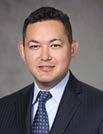
Ted Holmquist Principal Attorney/Founder
Law Office of Ted Holmquist, APC
Reflections: “I joined the SDCBA Leadership Academy to better understand my leadership strengths and opportunities and to grow alongside other community leaders I’ve learned to focus on my values and courageously step up I’ve also watched our cohort grow together as our journeys have evolved and new paths have emerged I would encourage anyone interested in authentic leadership and service — whether professional, personal, or in our community — to apply for the SDCBA Leadership Academy!”
See Scholar bios at www.sdcba.org/2024-LA-Scholars

Mark-Robert Bluemel
Associate Attorney
McDougal Boehmer Foley Lyon Mitchell & Erickson
Reflections: “My reason for joining the Leadership Academy was to deepen my understanding of leadership and to connect with other likeminded attorneys The benefits of participating in the Academy far exceeded my expectations We had the opportunity to meet fascinating and influential members of the San Diego legal community, explored the multifaceted aspects of what makes a good leader, and, in the process, we learned more about ourselves ”
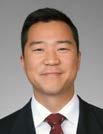
Kevin Chang Associate Sheppard Mullin
Reflections: “I applied to the SDCBA Leadership Academy to become a better advocate for myself and my team and to connect with other growing leaders in the San Diego legal community Through the Leadership Academy, I’ve gained new perspectives, developed an authentic leadership style that builds on my strengths and values, and grown alongside an amazing team of attorneys ”

Rolando Gudiel Sanchez
SDVLP Staff Attorney & Air National Guard Deputy Staff Judge Advocate
Reflections: “I joined the SDCBA Leadership Academy because I wanted to hone my leadership skills and connect with other attorneys within our community who share similar values The most important lesson I learned was that being your authentic self is not only empowering for you, but for those you are leading as well If you’re looking to unlock and unleash your inner hero, join the Academy and dive in with conviction You’ll be happy you did ”

Claudia Ignacio Owner
Law Office of Claudia Ignacio
Reflections: “I joined the SDCBA Leadership Academy because as I stepped into leadership roles I felt like I was missing something Neither law school or law firms teach leadership skills The Academy has given me the tools to lead with empathy and compassion But most importantly it has taught me to acknowledge and respect my own values, to communicate authentically and adopt a growth mindset I encourage everyone in a leadership position or seeking one to enroll in the Academy ”


Tamra Lett
Divorce & Family Law Attorney San Diego Divorce Lawyers, APC
Reflections: “Leadership Academy gave me a clearer vision of my authentic self and more self-awareness when communicating with I feel empowered to take ownership of my practice and my personal brand Challenges are now exciting opportunities for development To those considering Leadership Academy, go in with an open mind, try to learn from your cohort as much as you are learning about yourself, and visualize how you can grow personally or professionally in the future ”
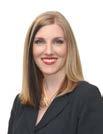
Koryn Sheppard
Sole Proprietor - Family Law Specialist
K. Sheppard Family Attorney
Reflections: “I joined the Leadership Academy to expand my knowledge base and toolkit so that I could be the best leader I could be
My key takeaways have been resilience, a growth mindset, human skills, and an understanding personality/communication style I encourage all practitioners to invest in their leadership journey and develop their unique leadership style ”
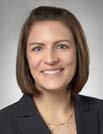
Rebecca Van Loon Partner
Solomon Ward Seidenwurm & Smith LLP
Reflections: “I was excited to join the SDCBA Leadership Academy to improve and learn new leadership skills to support my leadership growth within my firm and the community I’ve learned that leadership takes a tremendous amount of self-awareness, mindfulness, and compassion for those you are leading The speakers, program materials, and staff have been tremendous
If you are looking to take a deep dive into your leadership style and are prepared to challenge yourself — look no further ”

Amy West Of Counsel
Genesis Family Law, APC
Reflections: "I joined the Academy to reinvigorate my enthusiasm for the law and our community, but my takeaways from the experience are so much more I learned to authentically communicate my values using communication tools tailored to those hearing me, which is invaluable in law and life
For attorneys seeking personal and/or professional growth, apply! Not only will you benefit, but so too will all those who come into contact with you ”
See Scholar bios at www.sdcba.org/2024-LA-Scholars

James Maroulis Attorney
California Department of Public Health
Reflections: “I joined Leadership Academy to hone crucial leadership abilities like strategic thinking, communication, emotional intelligence, and leading with empathy The most important skill I learned in Leadership Academy is recognizing different personality types require different communication and motivational strategies Developing meaningful and powerful relationships with Leadership classmates is why I’d recommend applying ”
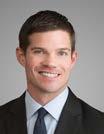
David Solberg
Senior Associate Sheppard Mullin
Reflections: “I joined the SDCBA Leadership Academy to strengthen my leadership skills in support of my professional development and for purposes of benefiting the broader community The most important lesson I learned from the Academy was the value of creating a clearly defined purpose and vision for oneself as a fundamental element of effective leadership I would highly recommend the Academy to anyone who is seeking new leadership skills and self-introspection ”
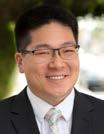
Matthew Wang
Associate Attorney
Sohagi Law Group
Reflections: “I joined the Leadership Academy to help myself understand my bosses and to eventually empower others to do meaningful work Analyzing our deepest values is the most important work in the Leadership Academy But anyone can take away the lessons about the human skills and communication that the Leadership Academy provides ”
Being a leader isn’t just implementing a set of skills. Being a leader requires knowing who you are, what you value, and having a vision for what’s next. The Leadership Academy provides a space to explore your authentic self, identify your core values, and create a vision for yourself and/or your organization. If this combination of learning skills and self-growth sounds appealing, you are a great candidate for the next Academy. For information about joining the 2025 cohort, contact Megan Moore, Chair, or visit the SDCBA website. Application and event dates will be released soon!


he Leadership Academy started in 2022 with the goal of providing tools to help lawyers rise to leadership positions. While we congratulate the recent achievements of the new graduates of the 2024 Leadership Academy, it’s important to reflect on the significant strides made by our past participants in their careers. Testimonies from our previous scholars highlight firsthand how beneficial the Leadership Academy has been for them. Their success stories may inspire others to join our 2025 cohort!

Jim Eischen - 2022
Owner/Eischen Law Office, APC
Eischen Law Office, APC
Reflections: “I joined the SDCBA Leadership Academy because I was growing my boutique national healthcare law office and my start-up online learning company, and I wanted to explore leadership training as I worked on growing my enterprises
My most cherished learning moments: connecting with amazing leadership speakers and working on my own personal vision of leadership The experience helped me decide to move forward with educational/consulting enterprises ”

Emily Howe - 2022
Principal/Founder
Law Offices of Emily E. Howe
Reflections: “During and since the Academy I have served as an officer on bar boards, assisted community-based organizations and collaborated with leaders in San Diego, California, and nationally I met and spoke at the Consulate General’s House of the Republic of Korea Different earned media have provided recognition as a top leader in the law or reported on families and individuals I have represented Lasting lessons include the indelible value of grace, kindness, thoughtfulness, and authenticity ”

Chelsea Mutual - 2023
Senior Appellate Attorney - California Court of Appeal
Reflections: “Since completing the Leadership Academy, I ran for and was elected to the Lawyers Club board of directors, joined the San Diego County Commission on the Status of Women and Girls’ policy committee, and have become more active in the SDCBA’s DEI Division and the Tom Homann LGBTQ+ Law Association One of the most meaningful parts of my Academy experience, however, is the connections I made with community leaders and my fellow participants ”

Maria Chavez - 2022
Immigration Legal Director/OwnerPANA/Maria Chavez Law
Reflections: “I joined the Academy because I was moving into leadership roles at work and within the legal community I wanted to learn how to truly lead and inspire others Because of the courage and other skills I learned in the Academy, I left my firm and joined a nonprofit to help them start their immigration department and opened my own small firm I encourage all attorneys interested in leadership to look inward, with which the Academy will help, to develop and hone these skills ”
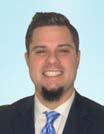
Lucas Hirsty - 2022
Deputy Public Defender III - San Diego County Public Defender’s Office
Reflections: “Since graduating from the Leadership Academy, I have a new sense of confidence and strive to be my best and authentic self I have seen the positive impact of the skills I learned in the Academy on both my personal and professional lives The Academy helped me be a better listener and communicator I also seek out leadership positions and now sit on the Leadership Academy Subcommittee and the Public Defender union’s DEI subcommittee ”

Patrick McGill - 2022
Attorney McGill
&Co., P.C.
Reflections: “I am a proud member of the inaugural cohort of Leadership Academy scholars I applied for the Academy to expand my connections and leadership opportunities in San Diego County and have stayed involved as a member of the Leadership Academy Subcommittee over the past two years Both experiences have offered me incredible and exciting opportunities to grow as a leader both internally and within our community (and to meet and engage with current leaders!) ”

Seana Scholtemeyer - 2023
Senior Trial Attorney
Walton Law APC
Reflections: “I joined the SDCBA Leadership Academy to receive formal leadership training, build lasting relationships with other lawyers in San Diego, and learn tools and resources for motivating a team with authenticity The lessons we learned about curious listening and having difficult conversations have been invaluable every day With the encouragement and help of the lawyers at Leadership Academy, I was elected to the Lawyers Club Board of Directors I highly recommend Leadership Academy ”
By Scott Pirrello
When I tell people that I’m an elder abuse prosecutor, most people envision that most of my work would involve victims in nursing homes who are not being taken care of. While elder neglect is a serious issue, elder abuse prosecutors pride themselves on being experts in many disciplines because we serve an older population rather than a particular category of cases. As head of Elder and Dependent Adult Abuse Prosecutions for the San Diego District Attorney’s Office, I handle the following types of cases:
• Physical abuse cases: Physical assault by family members, caregivers, or strangers, including many random attacks from low-level minor incidents up to and including cases with significant trauma and homicide.
• Financial abuse cases: Theft by family members, caregivers, unscrupulous professionals, unlicensed contractors, and scam artists. These cases can be minor thefts and go all the way up to complex economic, insurance/annuity, or real estate fraud.
• Elder scams: The District Attorney’s Office is leading a first-of-its-kind Elder Justice Task Force in collaboration with the FBI to stem the tsunami of elder fraud hitting us every day. Shockingly, San Diego County alone last year had almost $100 million in losses from our elder scam victims. We are fighting every day to recover any money we can for our victims.
• Sexual abuse cases: Sexual assault of vulnerable adults and seniors, including those who are compromised due to advanced cognitive decline. These cases can involve lower-level allegations or rise to the unthinkable, including rape, oral copulation, and other acts on the most vulnerable in our population.
• Neglect cases: Neglect involves allegations where an elder or vulnerable adult relies on others for their care and when these needs are not met in nutrition, medical care, safe environments, and supervision.
Criminal cases can arise in any of these scenarios, but there are also many other forms of abuse that would not rise to the level of criminal abuse. In fiscal year 2022–23, San Diego County Adult Protective Services received over 24,000 referrals for suspected elder and dependent adult
abuse. Referrals do not always result in criminal elder abuse charges. Criminal abuse must be proven in a court of law by convincing a unanimous jury beyond a reasonable doubt of one’s guilt. A lot of our time as elder and dependent adult abuse prosecutors is spent talking to families and members of the public about their cases and explaining that other remedies besides criminal justice intervention may be available, often through the civil or probate courts or sometimes through small claims court.
The best thing you can do if you are concerned about any family member, neighbor, or friend who you suspect is at risk of any form of abuse going on is to immediately make a referral through Adult Protective Services (APS), which is often the first step in getting a particular case on the radar of those important county agencies that have the ability to help. To make a referral in San Diego, call 1-800-339-4661, and if you have additional concerns after calling, you should continue to make referrals.
Many people are afraid to call or are afraid they are being nosy by calling on a neighbor or someone from the book club or church. But when you call APS, you are anonymous, and you don’t have to believe a crime is going on. You just merely need to suspect that someone vulnerable may be at risk.
If you believe a situation is more serious and that a crime is occurring, anyone should never hesitate to call their local police to report a crime or request a welfare check.
If you believe your family has a need to talk to a civil or probate attorney contact the San Diego County Bar Association’s Lawyer Referral Line to consult with the appropriate legal counsel.
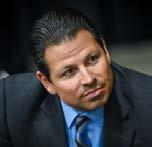
Scott Pirrello is the Head of Elder Abuse
Prosecutions for the San Diego District Attorney’s Office and has been a prosecutor for almost 19 years. Since 2009, Scott has been assigned to the Family Protection Division prosecuting a variety of family violence cases, including elder abuse, domestic violence, and child abuse cases but now focuses exclusively on prosecuting all varieties of elder abuse from theft and neglect to sexual assault, cases of violence, and murder.

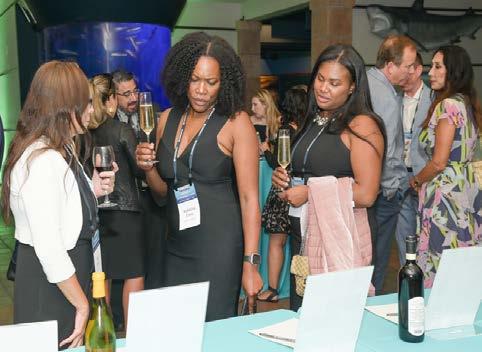
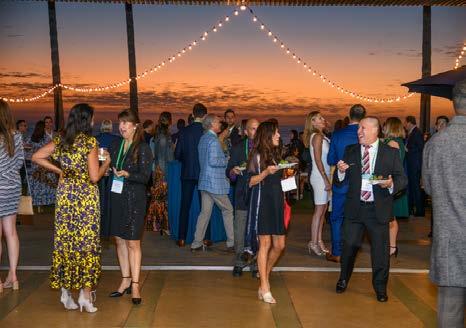


At the San Diego County Bar Foundation (SDCBF), our mission is to create access to justice by funding nonprofit organizations providing crucial legal services to underserved populations. Made up of dedicated lawyers, our Foundation prides itself on being a good steward of funds. This is achieved through the diligent work of our board members, who meticulously vet the nonprofits applying for grant funds. To share the personal motivations behind our service and to inspire other lawyers to get involved, we present “Why I Serve,” a collection of reflections from our board members.
The commitment to helping underserved communities is a common thread that binds our board members. Deborah Dixon, of the Dixon Firm, eloquently expresses this sentiment: “I serve because I believe in the mission to help the underserved populations, and I know the Foundation’s impact is far greater than I can make on my own. I have confidence in the Foundation doing the hard work investigating local nonprofit organizations and determining how our donations can make the biggest difference.” This confidence in the Foundation’s diligence underscores why many of us dedicate our time and resources to this cause.
For some, the mission of the SDCBF is deeply personal. Elidia Dostal, of Vanst Law, said“As a first-generation American who grew up in a low-income home, I benefited directly from programs provided by non-profit organizations. I serve on the SDCBF board to help fund the San Diego non-profits that provide these life-changing legal services at no

cost to our community.” This personal experience with the transformative power of nonprofit services drives their commitment to ensuring others receive the same opportunities.
Many of our board members are motivated to support those who often feel overlooked. Kyle Overs, of Hahn Loeser, “I serve on the Foundation to support organizations in our community that provide critical legal services to the underserved populations in San Diego that are often otherwise overlooked and feel like they have no place to turn. The organizations we support give those populations the support and power they need and deserve.” This focus on empowerment and support is a cornerstone of our work at the Foundation.
For those like Cassandra Thorson, of Thorson Law Group, serving on the Board allows them to extend their reach beyond their individual practice:
“For the past 40 years, I have helped my community obtain justice for those wrongfully injured and defrauded. As a sole practitioner, I can only help one client at a time. Serving on the Board allows me, through the grant process, to help provide pro bono legal services to hundreds of individuals who would otherwise go unserved.” This broader impact is a powerful motivator for many of our board members.
Some see their service as a fundamental responsibility of their profession. Scott Schindler, of JLL, said, “Why I serve? Because it’s our inherent duty as members of the bar to give back to those
legal organizations that help those less fortunate.” This sense of duty is a driving force behind the dedication of our board members.
The Foundation’s tangible impact on the community is a common theme among our board members. Ruth Spillane, of Fragomen, notes, “I serve on the Board because we make a tangible difference in our community by empowering vulnerable populations through access to justice.” This impact is seen and felt in the lives of those we help every day.
Finally, for some, it’s about giving back to the community that has supported them. Stephanie Reynolds, of Fisher and Phillips, reflects, “I joined the Foundation Board to give back to the community by helping to raise funds used to support deserving organizations that provide and promote access to justice for those in need.” This desire to give back is at the heart of what we do at the SDCBF.
Our board members’ reflections highlight the profound impact the SDCBF has on our community and the deep commitment of those who serve. We invite you to join us in this mission through donations or by serving on the Board. Together, we can continue to make a significant difference in the lives of those who need it most.

hen the San Diego County Bar Association was formed in 1899, there were already established courts with judges and prosecutors in San Diego. However, there was no established agency to assist indigent defendants in fighting the good fight in criminal matters.
In about 1918, Mr. DeWitt Mitchell, a graduate of Stanford Law School, was a well-established attorney in San Diego. Mitchell dreamed of creating the Office of Public Attorney in San Diego County.
Mitchell set forth his vision of the public attorney in his will one year before entering the United States Army Air Corps to serve in World War I.
“All persons who shall apply to the public attorney for assistance and who shall appear in need and without funds to employ an attorney, the public attorney shall prosecute or defend their rights and give them legal aid,” Mitchell wrote in his will.
Mitchell passed away while training to fight for his country. However, his will established a trust fund of $20,000 to pay for a public attorney in San Diego.
In 1919, the SDCBA conducted a competitive written examination among local attorneys to select the first public attorney. P.A. Whitacre became the first attorney funded by Mitchell’s trust.
A succession of prominent attorneys served the prescribed one-year term as public attorneys, including former Superior Court Judge John A. Hewicker, Municipal Court Judge Clarence Terry, Deputy County Counsel Duane J. Carnes, T.T. Crittenden, Wood F. Worcester, Cleveland Smith, John C. Thompson, Robert A. Estes, Ben Weissman, Alec Cory, and U.S. District Court Judge Howard Turrentine.
In 1964, Congress passed the Criminal Justice Act, which established a system for appointing and compensating legal representation for accused persons charged
with federal crimes who were unable to afford legal representation on their own.
The Federal Defenders Program of San Diego, Inc. was founded in 1966 with a grant from the Ford Foundation to provide legal services for the accused in the federal criminal courts. However, this program only provided legal services for indigent defendants in the federal courts. Defendants in state courts were not covered by this program.
In San Diego, in the 1960s, there was no central Public Defender’s Office for defendants in the state courts. In 1965, the San Diego County Board of Supervisors discussed the possibility of creating a Public Defender’s Office separate from the Federal Defenders Program for indigent criminal defendants in state court, but no decisions were made at that time.
At first, the courts in San Diego kept lists of attorneys who would accept the indigent cases as those matters arose. When a criminal defendant was able to convince a judge that they were unable to afford an attorney, the court appointed someone from that list.
In 1968, the Defender’s Program was formed to bring conformity and stability to this system.
In the late 1960s and early 1970s, the Office of Defender Services (and later the Community Defenders, Inc.) had written agreements with law firms and solo attorneys who would be assigned to represent indigent defendants in San Diego County. There were contracts that specified what cases would be assigned and amounts paid for the different types of cases.
There were real and perceived issues with both the Office of Defender Services and the Community Defenders, Inc. The attorneys assigned to represent the indigent defendants believed the pay rates for their services were too low and it took too long to receive payment. The county Board of Supervisors believed the programs were costing too much, and there was limited control regarding the quality of representation the accused were receiving.
In the mid-1980s, the county Board of Supervisors discussed forming a Public Defender’s Office again. Some of the main concerns of the Board included controlling the costs of providing representation to the indigent and ensuring that the indigent clients received proper legal representation.
The cost of the contract system with Community Defenders, Inc. rose mostly due to the increasing number of cases assigned to local defense attorneys. San Diego County paid $5.9 million for these services in 1981–82, $8.1 million in 1982–83, and $9.3 million (estimated) in 1983–84. These amounts included compensation for attorneys as well as funds for investigators and experts to assist the defense attorneys.
In March 1984, the San Diego County Board of Supervisors authorized a Public Defender’s Office with 21 attorneys and 13 staff members. The Board wanted to contain the rising costs of indigent defense and ensure the quality of services provided to these clients.
The local defense bar opposed this proposal; it believed the proposed workload for these attorneys was too large, and the Board did not budget adequate funds for hiring experts.
In August 1986, the Board of Supervisors was still debating the form the San Diego Public Defender’s Office should take. To control costs, the Board of Supervisors wanted to create an independent Public Defender’s Office that was not a county department.
Finally, the Board if Supervisors issued a proclamation stating that the San Diego Public Defender’s Office would open on Feb. 1, 1987, to begin hiring attorneys and staff. The office was set to be fully operational on July 1, 1987.
However, in May 1987, the Board of Supervisors
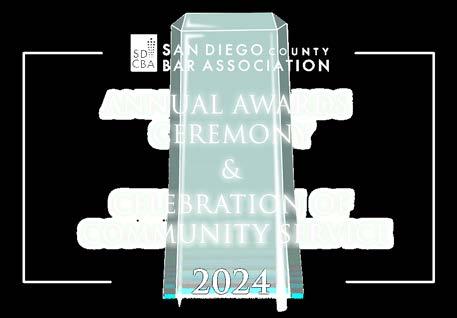
discovered that the San Diego City Charter required the supervisors to open the proposal for the new office up for bidding to any entity that was interested in establishing a Public Defender’s Office. This caused further delays while different groups submitted proposals for the model of the new office.
In 1988, the Board of Supervisors formed a countyoperated Public Defender’s Office based on the Federal Defender’s Office, which was already in existence.
Today, the county’s public defense system is managed by the Department of the Public Defender, which is composed of four independent and ethically walled law offices: the Primary Public Defender, the Alternate Public Defender, the Multiple Conflicts Office, and the Office of Assigned Counsel.
As of this year, the San Diego Public Defender’s Office had about 550 employees (including attorneys, investigators, and staff) and a budget of $130 million per year. This is a far cry from the days when Mitchell put $20,000 in a trust to fund a public attorney.
Thanks to the hard work and dedication of the local defense bar, courts, and county Board of Supervisors, defendants who count on publicly funded attorneys can rest assured that their interests are being protected by a staff of knowledgeable and hard-working public defenders.

Mark G. Spencer (mspencerlaw@hotmail.com) is a graduate of Campbell Law School and has been practicing criminal law in San Diego since 1999.

Sponsors
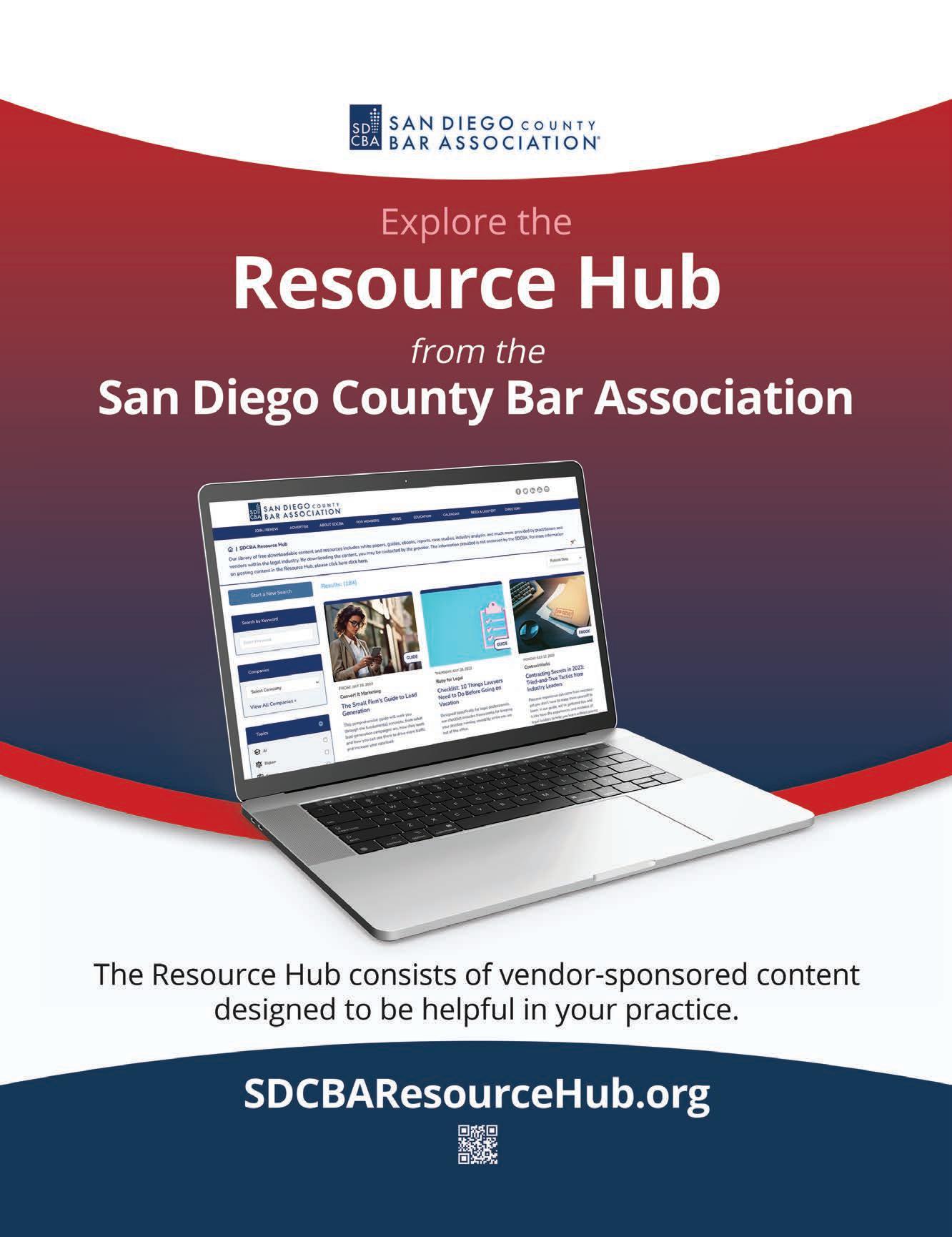
By Deborah Wolfe
If, at trial, counsel discovers that a document being offered into evidence by opposing counsel has been manipulated or altered, counsel should first request a brief recess to address the issue with opposing counsel and give counsel the opportunity to withdraw the document. If opposing counsel refuses to do so, the issue should be raised with the Court by objecting to the evidence as lacking authentication pursuant to Evidence Code sections 1400–1402 and/or as hearsay in that it lacks proper foundation for admission into evidence. It may require a sidebar conference out of the presence of the jury or a brief recess to have a full discussion of whether or not the document has been manipulated or altered.
The burden is on the party who is offering the document into evidence to prove its authenticity. This usually requires a live witness to verify the genuineness of the document. There may be presumptions of the authenticity of certain documents, e.g., Evidence Code §§ 1450–1454, 1530, in which case the burden of disproving authenticity is shifted to the party contesting it.
If the judge overrules counsel’s objection, it is possible, for instance, to impeach the witness who is being offered to authenticate the document. This can happen by showing the witness the original version of the document or by showing the witness an alternate version of the document that the witness may have attached to an email or other correspondence. It is important to note that the fact that the judge permits the writing to be admitted into evidence does not necessarily establish the authenticity of the document, only that there has been a sufficient showing of the authenticity of the writing to permit the trier of fact to find that it is authentic. The trier of fact — which may be the judge or the jury — determines the question of authenticity and may determine that the writing itself is not authentic if it disbelieves the evidence of authenticity presented by the party, i.e., the witness who testified to its authenticity. See Verzan v McGregor 23 Cal. 339, 342-343 (1863).
manipulated evidence and attempted to admit it in court, it may trigger the requirement of reporting misconduct of counsel pursuant to RPC 8.3. Failure to report such dishonesty as described in the Rule is itself a violation of the RPC.

Counsel should bear in mind that if they reasonably believe that opposing counsel has falsified a document or

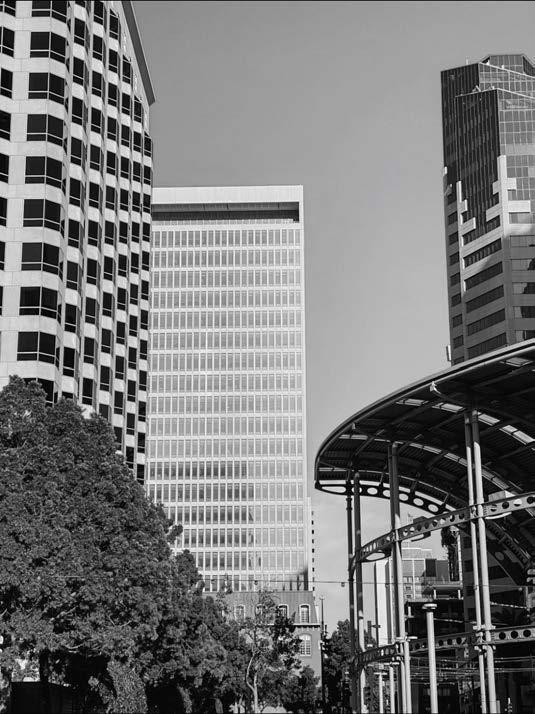
Deborah Wolfe is an experienced trial attorney who has served on and chaired the State Bar of California Legal Malpractice Law Advisory Commission. She has been a member of the San Diego County Bar Association’s Legal Ethics Committee since 2006, and is now its Chair. She frequently testifies as an expert witness in ethics and standard of care in Let's





As we learned in 1L year, the Rule Against Perpetuities requires the fate of a piece of property to be reasonably certain. A future property interest must permanently vest or forever fail within a foreseeable period of time to be viable. (I’d put the full rule in a footnote but to avoid evoking any law school trauma, I’ll kindly refrain.)
The same principle applies to your “interest” in a person whom you are dating. Although an initial period of nonexclusivity is to be expected, it cannot last indefinitely if you are seeking a committed, monogamous relationship. As the Rule Against Perpetuities mandates, there is a certain point at which the relationship either needs to be official or needs to be over.
Why do certain partners attempt to defy the Rule Against Perpetuities in begetting a drawn-out, ill-defined situationship? Violations of the rule are triggered by three specific types of property interests. To save you the trouble of digging up your old property outlines, here’s a review of the three violative future interests and how they might play out in your current situationship.
A contingent remainder is a future interest that is capable of vesting immediately following the known expiration of the current situationship. The situationship is one that will, by design, eventually terminate regardless of whether the contingent remainder vests. The contingent remainder vests only if a specified condition is met.
In dating, the contingent remainder is the person who likes spending time with you right now but who sees an end date from the start. This person might eventually become more attracted to someone else who meets the specified conditions, or their “interest” may simply fade over time for other reasons. This person will likely give you indications from the beginning that they are not looking for anything serious.
As frustrating as this can be, you can usually know what to expect with this person. The best advice here is to not get too attached, to maintain low expectations, and to end the situationship if you feel like your needs are not being met.
An executory interest is a future interest that enacts immediately once a specified condition is met. The executory interest necessarily interrupts a situationship that would otherwise continue.
In dating, the executory interest is the person who will lead you on, seeming genuinely interested, but who will abruptly jump ship as soon as someone else satisfies the specified conditions. Despite never expressly committing to you, this person will lure you into a false sense of security so that you feel blindsided when the tables turn.
The best advice here is to truly believe them when they say they want to “take things slow” or don’t want to “put a label” on the relationship. If you are looking for something serious, cut your losses now due to the recognition that more time will probably not persuade this person to commit.
A vested remainder subject to open (“open remainder”) is a future interest that vests following the known expiration of the current situationship. When the remainder vests, there is an inarticulable class of potential beneficiaries that can potentially broaden over time.
In dating, the open remainder is the former flame who will return in hopes of reconnecting but in a nonmonogamous sense. Unlike the contingent remainder, who will never be heard from again, the open remainder is flexible to multiple dating prospects, possibly including you if you allow that.
If you find yourself in this situation and are looking for a monogamous relationship, do not be charmed or persuaded by the open remainder. Absent a drastic change of mindset, this person will always be “subject to open” and will not be willing to fully commit to you or to anyone.
The three above-described future interests are likely to perpetuate a situationship, rather than a relationship. In rare cases, however, a situationship can gradually give rise to legally enforceable rights (i.e., an exclusive relationship) through adverse possession. For adverse possession to apply, the relationship must be:
1. 1. Actual: There must be actual interaction between the parties of a romantic or amorous nature.
2. 2. Adverse: The initial relationship must be nonmonogamous, i.e., adverse to an exclusive relationship.
3. 3. Exclusive: This is self-explanatory — you and your partner must agree that the relationship is exclusive.
4. 4. Open and notorious: You and your partner must openly acknowledge your exclusive relationship status to friends, family, and others.
5. 5. Plain view: You and your partner must go out on dates in public, make public introductions, and otherwise put the public on notice of your exclusive relationship.
6. 6. Term of years: You and your partner’s satisfaction of the above must persist for a reasonable time period to elevate the dynamic from situationship to relationship.
In most cases, the mere passage of time is not true adverse possession … but rather adverse regression of your mental and emotional health. It is key to look out for signs that your prospective partner cares more about their own needs than yours. Only you can know whether your current situationship is meant to vest or be put to rest.
*** Please note that this constitutes general information rather than legal advice. If you are preparing for the bar exam, do not import this dating-related commentary into your essays … unless you want yours to be featured as the sample on the California Bar website (and not necessarily in a good way). Consult a Barbri book or property law professor regarding your individual situation.
Do you have dating-related questions or stories/advice for lawyers? Send your questions, stories and advice to The Bachlawrette at bar@sdcba org for possible inclusion (anonymously, unless otherwise requested) in a future column.

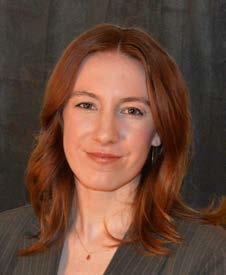
What are your main responsibilities at the Bar?
My main responsibilities include editing San Diego Lawyer Magazine, creating e-newsletters like “This Week at the Bar” and "For the Record,” and managing our advertising.
How long have you been working at the Bar?
I have been working at the Bar for five months.
What is your favorite part of your job?
My favorite part of this job is collaborating with writers or colleagues to create meaningful content for our readers, specifically in our magazine. I love being able to say that I have a job directly related to my journalism degree.


Katelynn Robinson Content and Publications Editor
What is your favorite movie and why?
My favorite movie changes a lot. Right now, my favorite movie is probably “Howl’s Moving Castle.” I love all the Studio Ghibli movies because they are all so beautiful.
What’s your favorite quote?
“Just keep swimming.” — Dory
What do you love about San Diego?
I love the weather, the beaches, and the variety of activities! I am learning to surf, and I enjoy walking around areas like North Park and Little Italy.

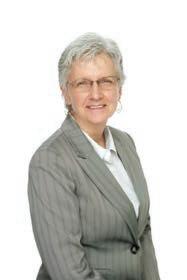




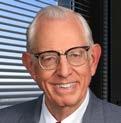
Robert G. Steiner, SDCBA President in 1972, has passed away at the age of 92.
Mr. Steiner was a long-time partner at Luce, Forward, Hamilton & Scripps, handling complex litigation. In addition to his role as SDCBA President, he was President of the San Diego Chapter of the American Board of Trial Advocates (1970), a Fellow in the American College of Trial Lawyers, and a member of Governor Deukmejian's Judicial Selection Committee.
He was the proud son of Fred Steiner, a local lawyer who practiced in criminal, civil, and maritime law. He and his wife Ann had two daughters and a son. He was always engaging, precise when he needed to be, and loved a good story.
Steiner was interviewed as part of the bar's Legal Legends project on Feb, 6 2006 (view the video at https://www.sdcba.org/robertsteiner and was profiled in the July/August 2014 edition of San Diego Lawyer Magazine.
In the January/February issue of “San Diego Lawyer,” an article titled “Diversity and the San Diego Judiciary” was published along with a chart that displayed demographic data of the San Diego Superior Court. This chart failed to include people with disabilities, people who are nonbinary, people who are multiracial, and people with veteran status. The SDCBA regrets this error and oversight.
Below is a more representative chart that provides broader demographic data, including data for 2024.
By Katelynn Robinson
Our esteemed Service Award recipients and their friends, families, and colleagues gathered to celebrate their dedicated service to the legal community on Tuesday, May 14.
As featured in the previous issue of San Diego Lawyer, the award winners are:
Outstanding Attorney
Charles M. Sevilla
Outstanding Jurist
Judge Margaret M. Mann (Ret.)
Community Service
Deborah Dixon
Service to Diversity
Vaani Chawla
Service by a Public Attorney
Tracy Prior
Service to the Legal Community
David Majchrzak
Service by a New Lawyer
Audrey Surridge
Distinguished Organization
Tariq Khamisa Foundation
The student poster contest award winners were announced by LRIS Chair Jeremy Golden. The winners are:
Grades K-5 First Place:
Emily Nawoj - Saint James Academy
Grades 6-8 First Place:
Sophia Swain - Saint James Academy
Grades 9-12 First Place:
Reymundo Perez - Lincoln High School
In the Service Awards video that was played, Tasreen Khamisa said, “The Tariq Foundation was born out of the power of restorative justice and forgiveness.” She explained how her brother, Tariq Khamisa, was the inspiration for the foundation. Tariq was killed at age 20 by 14-year-old Tony Hicks.
Her father saw “victims at both ends of the gun.” He understood that “Tariq was a victim of Tony, but Tony was a victim of society, a society that we all jointly created.” Khamisa emphasized how raising a generation of peacemakers would make this country a very different place.
Awards were announced by the 2024 SDCBA Awards Committee Chair Brandon Kimura, and each recipient shared a few words with the audience.
“Judge Weber... has seen firsthand what is possible when we embrace the principles of restorative justice,” Khamisa said. “Her nomination is a powerful endorsement of our mission and a reminder of the profound change that can arise from even the most heartbreaking circumstances.”
“It doesn’t have to be big or grand; it can be small because I promise you it won’t feel small to the person you’re helping,” Audrey Surridge said.
David Majchrzak opened by describing a new problem he called “perpetual volunteer syndrome,” which is “this nagging caring about people.” He said knows of no cure for “perpetual volunteer syndrome” and hopes never to find one.
Charles M. Sevilla accepted his award in memory of his friend and colleague, John Cleary, who trained him. “He taught me tenacity, advocacy, diligence, integrity, and his five P’s which were ‘prior preparation prevents poor performance,’ certainly a truism,” Sevilla said.
Tracy Prior specifically thanked Summer Stephan for teaching her to lead with strength and grace. “Summer, thank you for answering the call to duty, to lead an office like ours of warriors, and for showing me … what a servant leader looks like,” Prior said.
“Together, we support and inspire one another to increase diversity among our ranks and to advocate for the underrepresented,” Vaani Chawla said. “In my world, and in the world of my service-oriented peers, community service is the public expression of love.”
Deborah Dixon said, “We all contribute so much in our own individual ways, but collectively, we’ve been able to accomplish far more than any one individual.”
Honorable Margaret M. Mann celebrated her retirement status and said although she loves to tell jokes, she is grateful for the entire legal community and described everyone in the room as “true believers.”

Katelynn Robinson (krobinson@sdcba.org) is the Content and Publications Editor for the SDCBA.
May 14, 2024
The SDCBA once again celebrated the inspirational contributions of attorneys and nonprofits who have gone above and beyond to serve those in need in our community. In doing so, they remind us why we serve, and motivate us to get involved. This year's recognition luncheon was held at the beautiful Westin San Diego Gaslamp Quarter.


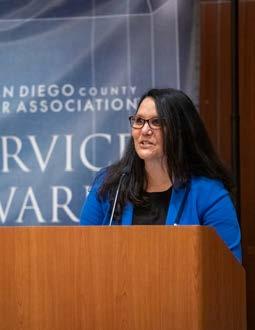
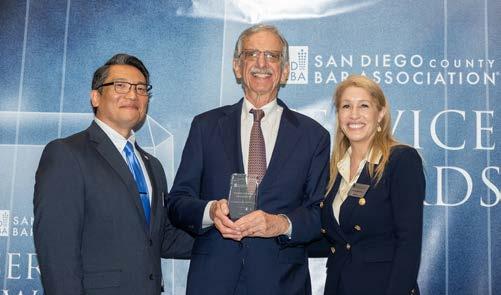
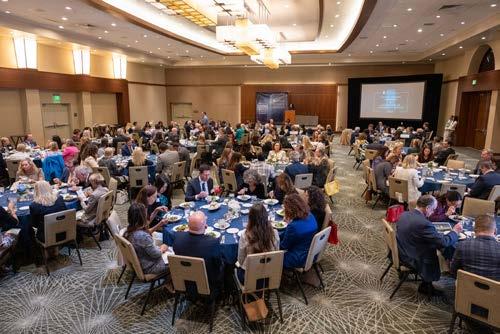
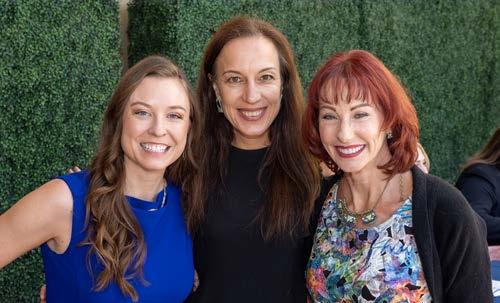
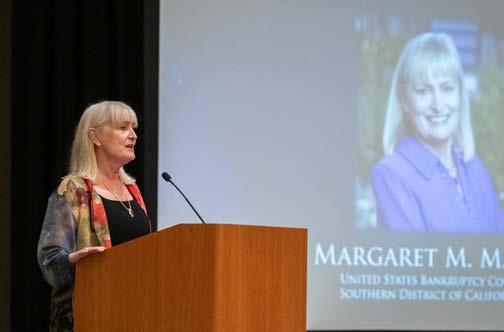

The San Diego County Bar Association wants to thank all of the San Diego law firms, public agencies, and nonprofit legal organizations that have provided SDCBA membership to 100% of their attorneys in 2024. Your commitment to the San Diego legal community is greatly appreciated.
100% Club member list as of July 2024
Allen Matkins Leck Gamble Mallory & Natsis LLP
Allen, Semelsberger & Kaelin, LLP
Ames Karanjia LLP
Antonyan Miranda, LLP
Appellate Defenders, Inc.
Astuno & Associates, APC
Atkinson, Andelson, Loya, Ruud & Romo
Beamer, Lauth, Steinley & Bond, LLP
Beatrice L. Snider, APC
Bender Kurlander Hernandez & Campbell, APC
Best Best & Krieger, LLP
BioMed Realty Trust, Inc.
Blackmar, Principe & Schmelter APC
Blanchard Krasner & French
Bobbitt, Pinckard & Fields, APC
Brierton Jones & Jones, LLP
Buchanan Ingersoll & Rooney PC
Burke, Williams & Sorensen, LLP
Burton Kelley, LLP
Butterfield Schechter LLP
California Western School of Law
Case Harvey Fedor
Casey Gerry
Chalifoux, Brast, Thompson & Potocki APC
Christensen & Spath LLP
Cohelan Khoury & Singer
Dean Gazzo Roistacher LLP
Devaney Pate Morris & Cameron, LLP
Dietz, Gilmor & Chazen, APC
District Attorney’s Office of San Diego
Donald R. Holben & Associates, APC
Duckor Metzger & Wynne ALC
Fennemore
Ferris & Britton, APC
Fisher Phillips LLP
Fitzgerald Knaier LLP
Flanagan Law, APC
Fleischer & Ravreby
Gatzke Dillon & Ballance LLP
Genesis Family Law, APC
Goodwin Brown Gross & Lovelace LLP
Green Bryant & French, LLP
Greene & Roberts LLP
Grimm, Vranjes Greer Stephan & Bridgman LLP
Gruenberg Law
Haeggquist & Eck, LLP
Hahn Loeser & Parks, LLP
Henderson, Caverly & Pum, LLP
HHJ Trial Attorneys
Higgs Fletcher & Mack LLP
Hoffman & Forde
Hooper, Lundy & Bookman, PC
Horton Oberrecht & Kirkpatrick, APC
Hughes & Pizzuto, APC
Jackson Lewis PC
Judkins, Glatt & Rich LLP
Karen D. Wood & Associates
Kennedy & Souza, APC
Klinedinst PC
Koeller Nebeker Carlson & Haluck LLP
Kriger Law Firm
Legal Aid Society of San Diego, Inc.
Lincoln Gustafson & Cercos LLP
Macdonald & Cody, LLP
McCloskey Waring Waisman & Drury LLP
McDougal Boehmer Foley Lyon Mitchell & Erickson
Miller, Monson, Peshel, Polacek & Hoshaw
Mintz
MoginRubin LLP
Moore, Schulman & Moore, APC
Musick, Peeler & Garrett LLP
Neil, Dymott & Hudson, APLC
Niddrie | Addams | Fuller | Singh LLP
Noonan Lance Boyer & Banach LLP
Office of the Carlsbad City Attorney
Office of the Public Defender
Office of the San Diego City Attorney
Pettit Kohn Ingrassia Lutz & Dolin PC
Pillsbury Winthrop Shaw Pittman LLP
Preovolos Lewin, ALC
Procopio, Cory, Hargreaves & Savitch LLP
Quarles
San Diego Unified Port District
San Diego Volunteer Lawyer Program, Inc.
Schor Vogelzang & Chung LLP
Schwartz Semerdjian Cauley Schena & Bush LLP
Seltzer|Caplan|McMahon|Vitek ALC
Sheppard, Mullin, Richter & Hampton LLP
Shustak Reynolds & Partners, PC
Siegel, Moreno & Settler, APC
Solomon Minton Cardinal Doyle & Smith LLP
Solomon Ward Seidenwurm & Smith, LLP
Stokes Wagner, ALC
Sullivan, McGibbons, Crickard & Associates, LLP
Thorsnes Bartolotta McGuire LLP
Tresp, Day & Associates, Inc.
Walsh McKean Furcolo LLP
Webb Law Group, APC
Weitzen Phillips Samuth & Sinex LLP
Winet Patrick Gayer Creighton & Hanes ALC
Wingert Grebing Brubaker & Juskie LLP
Wirtz Law APC
Witham Mahoney & Abbott, LLP
Withers Bergman LLP
Wright, L'Estrange & Ergastolo
All information shown is as of July 2024, and subject to change without notice.



LISTSERVS TO CONNECT YOU WITH FELLOW MEMBERS
Online community connecting you to colleagues in 27 practice area sections.
TECH & LAW PRACTICE CONSULTING
Level up your law practice management with online expert help from our resident Technology and Practice Management Advisor!
ACCESS TO THE ONLINE MEMBER DIRECTORY
Look up any of your fellow SDCBA members in our comprehensive directory — available only to members.



BUSINESS SERVICES
CUSTOM-CRAFTED EXPERT CLE!
Choose from a wide selection of timely CLE content spanning the gamut of topics, designed to best help you fulfill your CLE requirements. Visit www.sdcba.org/cle-center.
EXCLUSIVE FREE BANKING BENEFITS
Remote deposit service, interest-bearing personal checking, no-first-year-fee commercial credit card & business line of credit.

SAVE UP TO 40% ON SHIPPING
MANAGEMENT


Previously Office Depot Business Solutions Division



20% DISCOUNT ON SELECT CAREER CENTER JOB POSTING PACKAGES
LEGAL ETHICS HOTLINE
Call for guidance and perspective on a variety of ethical considerations in the practice of law. (619) 231-0781 x4145
FREE! NOTARY SERVICE
Schedule your free notary appointment with one of our notaries at the SDCBA Downtown Bar Center.

UNLIMITED CLE ALL YEAR FOR JUST $150!
Get your All-Access CLE pass when you join the SDCBA, or purchase at any time from your Member Profile.
TAKE 10% OFF OFFICE PRODUCTS
Enjoy savings on more than 30,000 office supplies.

SAVE UP TO 25% ON CAR RENTALS
® COMPETITIVE FEES, GREAT RANGE OF FUNDS
One of the leading providers among bars nationwide.
SAVE 10% ON YOUR FIRST THREE OUTSOURCED PROJECTS!
Outsource legal work to freelance lawyers. Increase profitability, efficiency, and flexibility!
SAVE 10% ON PRACTICE MANAGEMENT
Clio's legal practice management and client intake software simplifies running your law firm.

10% LIFETIME DISCOUNT
Work faster and bill more time with this productivity suite for Clio users.

TRUST ACCOUNT MANAGEMENT SOFTWARE DISCOUNTS
TrustBooks software for small law firms helps you easily manage your trust account.
LAWYER REFERRAL & INFORMATION SERVICE



SAVE UP TO 30% ON PC PRODUCTS
FIRST THREE MONTHS FREE
Sign up today and save a bundle on the go-to payment solution for your law practice.
SAVE 7%, PLUS NO SETUP FEE
Cultivate great relationships with Ruby’s live virtual receptionist service. Ruby will answer, transfer, take messages, and delight every caller for you!
LEGAL DOCUMENT AUTOMATION SOFTWARE
10% off the 1st-year subscription for new users.
HIRE VIRTUAL ASSISTANTS FROM LATIN AMERICA AND LET THEM TAKE CARE OF YOUR TO-DO LIST!
DIGITAL MARKETING PACKAGES TAILORED FOR YOUR LAW FIRM.
Receive 25% off digital packages and two complimentary months of social media management.
GET MORE CLIENT REFERRALS IN SAN DIEGO & IMPERIAL COUNTIES!
The SDCBA’s Lawyer Referral and Information Service (LRIS) referred over 60,000 clients to participating lawyers in 2023, resulting in almost $8 million in legal fees earned. Learn more about joining LRIS at www.sdcba.org/joinlris.
